Bangladesh offers medical education with modern facilities and affordable tuition fees compared to many countries. Renowned medical universities like Dhaka Medical College, and Bangladesh Medical College attract international students. The curriculum follows international standards, with emphasis on clinical exposure. Cultural diversity and rich experiences make studying medicine in Bangladesh rewarding.

Bangladesh, located in South Asia, is a densely populated country with a rich cultural heritage and a history dating back millennia. Despite challenges like poverty and natural disasters, it has made significant progress in various sectors, including agriculture, textiles, and technology. Dhaka, its capital, is a bustling metropolis, while historic sites like the Sundarbans mangrove forest and the ancient city of Paharpur draw tourists. The country's economy is primarily driven by agriculture, garment exports, and remittances. Bangladeshis are known for their warmth and hospitality, and Bengali cuisine is celebrated worldwide. It continues to strive for development and prosperity amidst its unique blend of tradition and modernity.


| Intake | May - October & Feb Intake |
|---|---|
| Score Required in 10+2 | 60% in PCB |
| NEET Requirement | Yes, NEET Qualified |
| Fees Structure | 5000 – 10000 USD Per Year |
| Hostel | 50 to 150 USD Per Month |
| Duration | 5+1 Years (Including Internship) |
| Medium of Instruction | English |
| Top Medical University | Dhaka National Medical College |
| Recognition | WHO, ECFMG, NMC, BMDC, FAIMER |
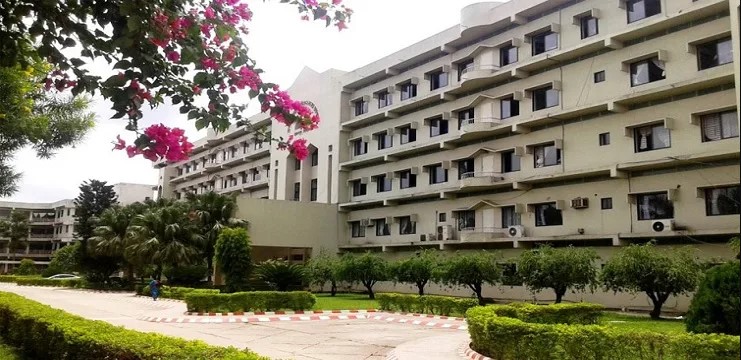
Dhaka National Medical College (DNMC), affiliated with University of Dhaka located in Bangladesh, stands as a prominent institution in medical education and healthcare in the region. Established to address the growing demand for quality medical professionals, it has a rich history, a diverse student body, and a commitment to excellence in medical training, research, and patient care.
Dhaka National Medical College was founded in 1925 as the Dhaka National Medical Institute. It has since evolved into a full-fledged medical college and hospital, catering to the healthcare needs of the population while producing skilled medical professionals. Over the decades, it has expanded its facilities, curriculum, and research endeavours to meet the changing demands of the medical field and the community it serves.
Dhaka National Medical College offers undergraduate and postgraduate medical education programs. The undergraduate program leads to the award of the Bachelor of Medicine, Bachelor of Surgery (MBBS) degree, which typically spans five years, followed by a one-year internship program. The curriculum integrates theoretical knowledge with practical clinical experience, ensuring students are well-prepared for the challenges of modern medical practice.
The college also provides postgraduate training across various specialties, allowing doctors to pursue advanced studies and specialize in their areas of interest. These programs contribute to the development of highly skilled medical professionals capable of addressing diverse healthcare needs.
Dhaka National Medical College boasts a dedicated faculty comprising experienced physicians, researchers, and educators committed to nurturing the next generation of healthcare professionals. The faculty members bring a wealth of clinical expertise and academic credentials to the institution, enriching the learning experience for students and contributing to the advancement of medical knowledge through research and scholarly activities.
Dhaka National Medical College is equipped with modern infrastructure and state-of-the-art facilities to support its academic and healthcare missions. The college campus includes lecture halls, laboratories, libraries, and administrative offices designed to facilitate teaching, learning, and research activities. The attached hospital provides comprehensive healthcare services to patients, serving as a training ground for medical students and residents.
Dhaka National Medical College has 850 bed hospital equipped with advanced medical equipment, diagnostic facilities, and specialized departments to cater to a wide range of medical conditions and treatment modalities. From outpatient care to critical care services, it is committed to delivering high-quality, compassionate healthcare to individuals and communities in need.
Research is an integral part of Dhaka National Medical College academic culture, with faculty and students actively engaged in scientific inquiry across various medical disciplines. The college encourages research initiatives aimed at advancing medical knowledge, improving patient care, and addressing public health challenges. Through collaboration with national and international partners, It contributes to the global body of medical literature and fosters innovation in healthcare delivery.
Dhaka National Medical College stands as a beacon of excellence in medical education, research, and healthcare delivery in Bangladesh and beyond.
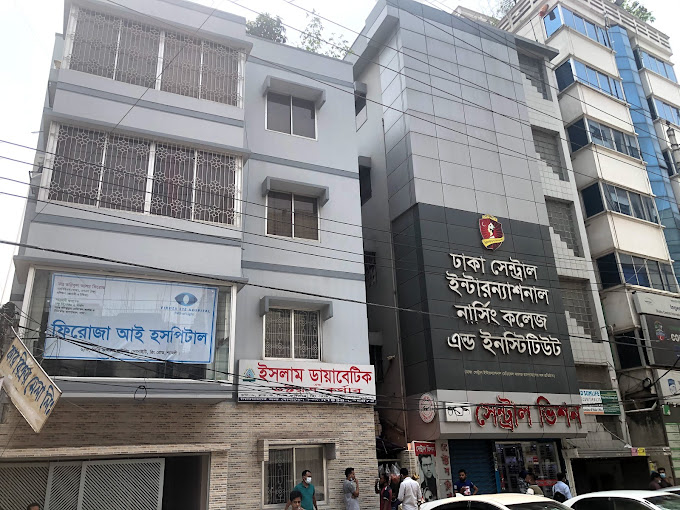
Dhaka Central International Medical College stands as a beacon of medical education and clinical excellence in Bangladesh. Established with a vision to produce competent healthcare professionals and contribute to the advancement of healthcare in the region, Dhaka Central International Medical College has emerged as a premier institution renowned for its academic rigor, state-of-the-art facilities, and commitment to community service. In this comprehensive exploration, we delve into the academic curriculum, clinical training programs, infrastructure, challenges, and achievements of Dhaka Central International Medical College.
The college offers a five-year course of study, approved by the Bangladesh Medical and Dental Council (BMDC), leading to a Bachelor of Medicine, Bachelor of Surgery (MBBS) degree from Dhaka University. It offers a comprehensive academic curriculum designed to equip students with the knowledge, skills, and professionalism required to excel in the field of medicine. The curriculum is structured to provide a solid foundation in basic medical sciences, followed by clinical rotations and practical training in various specialties. Courses are delivered by experienced faculty members who are experts in their respective fields, ensuring that students receive quality instruction and mentorship throughout their academic journey.
The academic program at DCIMC emphasizes interactive learning methods, including lectures, tutorials, case discussions, and hands-on clinical training. Students are encouraged to actively participate in research projects, conferences, and workshops to broaden their understanding of medical science and develop critical thinking skills. Furthermore, the curriculum incorporates ethical principles, communication skills, and cultural competence to prepare students for the diverse challenges they may encounter in clinical practice.
Dhaka Central International Medical College provides extensive clinical training opportunities to its students through its 500 bed ultra-modern hospital and with leading other hospitals and healthcare institutions in Dhaka. Clinical rotations are an integral part of the curriculum, allowing students to gain practical experience in various medical specialties under the supervision of experienced physicians and specialists. These rotations expose students to a wide range of clinical scenarios, diagnostic techniques, and treatment modalities, ensuring that they develop competence and confidence in patient care.
The clinical training program at Dhaka Central International Medical College is designed to foster a holistic approach to healthcare, emphasizing patient-centered care, interdisciplinary collaboration, and evidence-based practice. Students have the opportunity to interact with patients from diverse backgrounds, providing them with valuable insights into the social, cultural, and economic factors influencing health and disease. Additionally, clinical training is supplemented by simulation exercises, skills labs, and workshops to enhance students' clinical skills and decision-making abilities.
DCIMC boasts state-of-the-art infrastructure and facilities that support its academic and clinical programs. The college campus is equipped with modern classrooms, lecture halls, laboratories, and libraries stocked with a vast collection of medical literature and resources. Additionally, the college has dedicated facilities for research, computer labs, and multimedia rooms to facilitate interactive learning and research activities.
In addition to its academic facilities, DCIMC has strong affiliations with leading hospitals and healthcare institutions in Dhaka, providing students with access to a diverse range of clinical settings and patient populations. These affiliations enable students to gain hands-on experience in real-world healthcare environments, preparing them for the challenges of clinical practice.
Dhaka Central International Medical College has made significant achievements in advancing medical education and clinical practice in Bangladesh. The college has produced a cohort of skilled and compassionate healthcare professionals who are making valuable contributions to the healthcare system. Moreover, DCIMC has established itself as a center of excellence in medical research, with faculty and students actively engaged in research projects addressing pressing healthcare challenges.
Furthermore, DCIMC has a strong track record of community engagement and service, with students and faculty participating in outreach programs, health camps, and public health initiatives to address the healthcare needs of underserved populations. Additionally, the college has forged partnerships with international organizations, universities, and healthcare institutions to enhance its academic and clinical programs and promote global collaboration in healthcare.
Dhaka Central International Medical College embodies excellence in medical education and clinical practice, playing a pivotal role in shaping the future of healthcare in Bangladesh. With its comprehensive academic curriculum, extensive clinical training programs, and state-of-the-art infrastructure, DCIMC continues to produce competent and compassionate healthcare professionals committed to serving their communities. Despite facing challenges, the college remains dedicated to its mission of advancing medical science, improving patient care, and promoting health equity in Bangladesh and beyond.
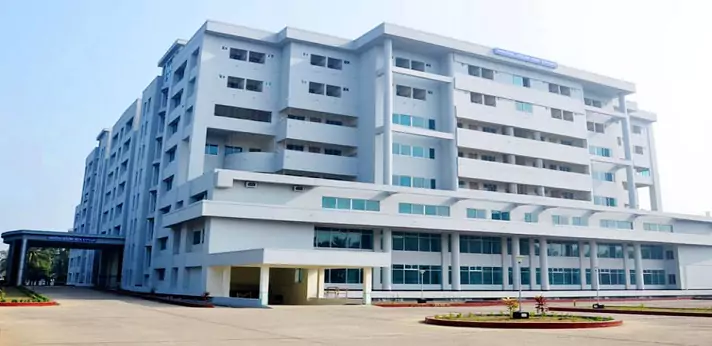
Established in 1986, Bangladesh Medical College stands as a beacon of excellence in medical education and healthcare delivery in Bangladesh. With a mission to produce competent, compassionate, and socially responsible healthcare professionals, BMC offers a comprehensive medical program that integrates rigorous academic training with hands-on clinical experience. In this exploration, we delve into the structure of BMC's medical program, its clinical training opportunities for students, and its commitment to shaping the future of healthcare in Bangladesh.
Bangladesh Medical College offers undergraduate and postgraduate programs in various disciplines of medical science. The undergraduate program leads to the degree of Bachelor of Medicine, Bachelor of Surgery (MBBS), which is recognized by the BMDC and affiliated with the University of Dhaka. The curriculum is designed to provide students with a comprehensive understanding of medical theory, practical skills, and clinical exposure.
Bangladesh Medical College medical program is designed to equip students with the knowledge, skills, and values necessary to excel as healthcare professionals in a rapidly evolving healthcare landscape. The curriculum follows international standards and guidelines, ensuring that graduates are well-prepared to meet the challenges of modern medicine. The academic program is divided into pre-clinical and clinical phases, each offering a unique learning experience.
During the pre-clinical phase, students are introduced to the fundamental concepts of medical science through a series of comprehensive courses. These courses cover subjects such as anatomy, physiology, biochemistry, pharmacology, pathology, and microbiology. Students engage in lectures, laboratory sessions, and small group discussions, allowing them to develop a strong foundation in basic medical sciences. Additionally, college emphasizes the importance of critical thinking, problem-solving, and communication skills, which are essential for effective patient care.
The clinical phase of Bangladesh Medical College medical program marks the transition from classroom learning to hands-on clinical training. Students rotate through various medical specialties, including internal medicine, surgery, pediatrics, obstetrics and gynecology, psychiatry, and primary care. Under the supervision of experienced faculty members and healthcare professionals, students participate in patient care activities, including history taking, physical examination, diagnostic procedures, treatment planning, and follow-up care.
Bangladesh Medical College offers a wide range of clinical training opportunities for its students, ensuring exposure to diverse patient populations, medical conditions, and healthcare settings. These opportunities are integral to students' professional development and preparation for future practice. Some key aspects of BMC's clinical training program include:
Hospital Rotations: Students rotate through affiliated hospitals, including both public and private healthcare facilities, gaining hands-on experience in different clinical departments. These rotations expose students to a variety of medical conditions, diagnostic techniques, and treatment modalities, enhancing their clinical skills and medical knowledge.
Elective Rotations: BMC offers elective rotations in specialized areas of medicine, allowing students to explore their interests and pursue advanced training in their chosen field. Whether it's cardiology, neurology, oncology, or any other specialty, students have the opportunity to work closely with specialists and gain insight into cutting-edge medical practices.
Research Opportunities: BMC encourages students to engage in research activities, promoting scientific inquiry and evidence-based practice. Students have access to research mentors, laboratories, and resources to conduct research projects on topics of interest. Participation in research not only enhances students' academic credentials but also fosters critical thinking and innovation in healthcare.
Simulation Training: BMC utilizes simulation-based training to enhance students' clinical skills and decision-making abilities in a controlled environment. Simulation labs equipped with high-fidelity mannequins allow students to practice medical procedures, emergency scenarios, and patient interactions, preparing them for real-world clinical challenges.
Bangladesh Medical College offers global health experiences for students interested in gaining insights into healthcare systems and practices beyond Bangladesh. Through international electives, exchange programs, and partnerships with overseas institutions, students have the opportunity to explore healthcare delivery models, cultural diversity, and global health issues firsthand.
Bangladesh Medical College (BMC) stands at the forefront of medical education and training in Bangladesh, preparing the next generation of healthcare leaders to meet the evolving needs of society. With a comprehensive academic program, extensive clinical training opportunities, and a commitment to excellence, BMC nurtures students' talents, compassion, and dedication to service. By providing a solid foundation in medical science, hands-on clinical experience, and exposure to diverse healthcare settings, BMC equips graduates with the skills and confidence to make a meaningful difference in the lives of patients and communities. Through its unwavering dedication to excellence and innovation, BMC continues to uphold its reputation as a premier institution of medical education and a beacon of hope for the future of healthcare in Bangladesh.
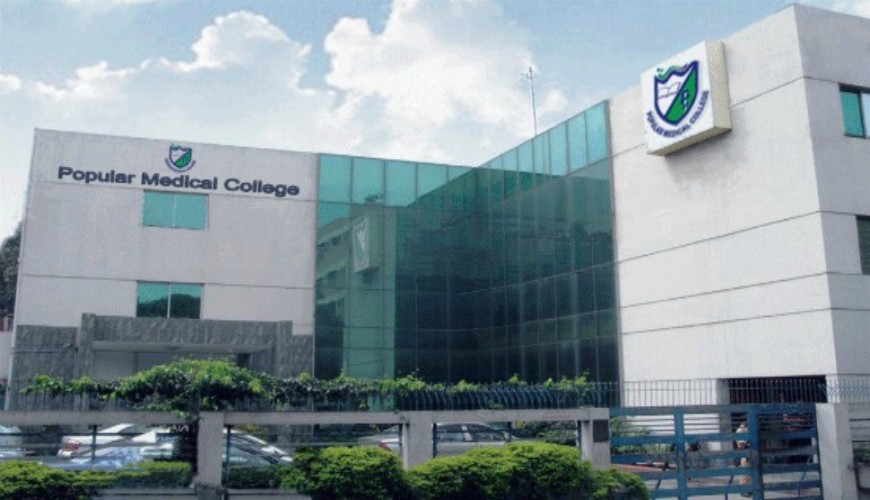
Popular Medical College in Bangladesh is among the premier medical institutions in the country, renowned for its commitment to excellence in medical education, research, and healthcare provision. Established with the vision of producing highly skilled medical professionals and improving healthcare outcomes, It has emerged as a significant contributor to the healthcare sector in Bangladesh. In this comprehensive exploration, we delve into the history, infrastructure, academic programs, faculty, research initiatives, and community engagement efforts of Popular Medical College.
Popular Medical College was founded in 2010 by Popular Medical College Trust with the aim of addressing the growing demand for competent healthcare professionals in Bangladesh. The institution obtained approval from the Government of Bangladesh and the Bangladesh Medical and Dental Council (BMDC) to commence its academic activities. Since its inception, PMC has been dedicated to fostering a culture of academic excellence, ethical practice, and community service.
With 500 bed multi-speciality hospital, Popular Medical College boasts state-of-the-art infrastructure and modern facilities to support its academic, research endeavors and clinical exposures to its students. The college campus is equipped with well-equipped lecture halls, laboratories, libraries, and research centers that provide students with a conducive learning environment. The institution also houses teaching hospitals where students gain practical experience under the guidance of experienced healthcare professionals. The college's commitment to maintaining high standards of infrastructure enhances the overall learning experience for its students.
Popular Medical College offers undergraduate and postgraduate programs in various disciplines of medical science. The undergraduate program leads to the degree of Bachelor of Medicine, Bachelor of Surgery (MBBS), which is recognized by the BMDC and affiliated with the University of Dhaka. The curriculum is designed to provide students with a comprehensive understanding of medical theory, practical skills, and clinical exposure. Additionally, PMC offers postgraduate programs in various specialties, allowing medical professionals to pursue advanced training and specialization in their chosen fields.
Popular Medical College takes pride in its esteemed faculty comprising experienced medical professionals, researchers, and academicians. The faculty members are dedicated to delivering high-quality education, conducting impactful research, and mentoring students to excel in their academic and professional pursuits. With their diverse expertise and commitment to excellence, the faculty plays a pivotal role in shaping the academic environment and fostering a culture of innovation and inquiry.
Research is an integral part of its academic framework, and the institution encourages faculty and students to engage in research activities that contribute to scientific knowledge and address healthcare challenges. PMC actively promotes interdisciplinary collaboration and provides resources and support for research initiatives across various medical disciplines. Through its research endeavors, PMC aims to advance medical science, improve healthcare practices, and address the healthcare needs of the population.
Popular Medical College stands as a beacon of excellence in medical education, research, and healthcare provision in Bangladesh. With its unwavering commitment to academic integrity, innovation, and community service, PMC continues to nurture the next generation of healthcare professionals and make significant contributions to the advancement of medical science and healthcare delivery. As Bangladesh strives to address its healthcare challenges and improve health outcomes for its population, institutions like Popular Medical College play a pivotal role in shaping the future of healthcare in the country.
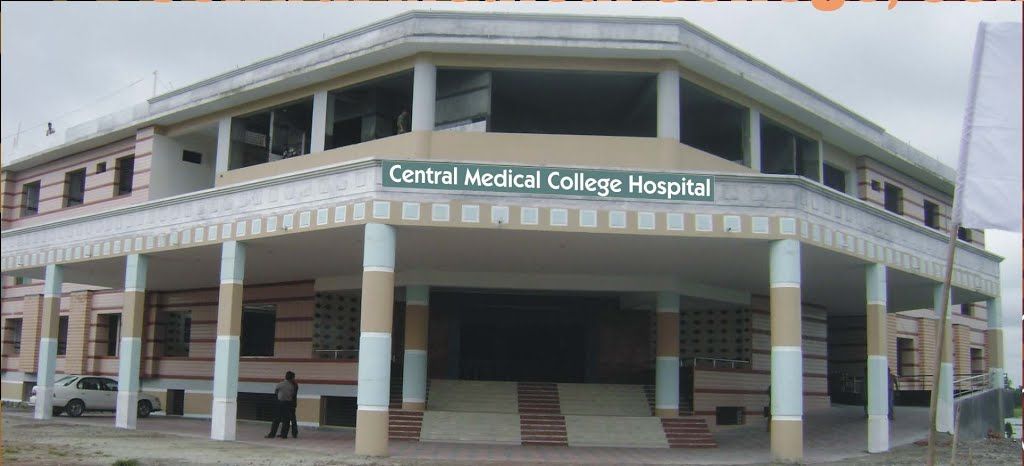
Central Medical College Bangladesh stands as a beacon of excellence in medical education, committed to nurturing the next generation of healthcare professionals equipped with the knowledge, skills, and compassion necessary to meet the evolving healthcare needs of society. Established in 2005, has garnered a reputation for its rigorous academic program and extensive clinical training opportunities. In this comprehensive overview, we delve into the structure of CMC's medical program, its clinical training for students, and its contribution to shaping the future of healthcare in Bangladesh.
Central Medical College offers undergraduate programs in disciplines of medical science. The undergraduate program leads to the degree of Bachelor of Medicine, Bachelor of Surgery (MBBS), which is recognized by the BMDC. Central Medical College medical program is designed to provide students with a holistic understanding of medical science, clinical practice, and ethical principles. The curriculum follows international standards and is tailored to meet the specific needs and challenges of the healthcare landscape in Bangladesh. It encompasses both pre-clinical and clinical phases, each aimed at equipping students with the foundational knowledge and practical skills essential for medical practice.
The pre-clinical phase of CMC's medical program focuses on building a strong foundation in the basic sciences fundamental to medicine. Students delve into subjects such as anatomy, physiology, biochemistry, pharmacology, and pathology through a combination of lectures, laboratory sessions, and interactive learning activities. Emphasis is placed on understanding the structure and function of the human body, as well as the underlying mechanisms of disease.
The clinical phase marks the transition from classroom learning to hands-on clinical training, where students apply their theoretical knowledge in real-world healthcare settings in their 250 bed hospital.This phase is characterized by immersive clinical rotations, bedside teaching, skills training, and community engagements.
Hospital Rotations: Students undertake rotations in affiliated hospitals, including tertiary care centers, district hospitals, and community health facilities. These rotations expose students to a wide range of medical specialties, patient populations, and clinical scenarios. Under the guidance of experienced faculty members and healthcare professionals, students participate in patient care activities, including history taking, physical examination, diagnostic procedures, treatment planning, and follow-up care.
Bedside Teaching: CMC emphasizes bedside teaching as an integral part of clinical training. Faculty members conduct bedside rounds with students, providing opportunities for direct patient interaction, clinical reasoning, and skill development. Through bedside teaching, students learn to integrate clinical findings, laboratory results, and patient histories to formulate accurate diagnoses and evidence-based treatment plans.
Clinical Skills Training: CMC prioritizes the development of clinical skills essential for competent medical practice. Students undergo training in essential clinical skills, such as history taking, physical examination, medical procedures, and patient communication. Simulation-based training, skills labs, and standardized patient encounters complement clinical rotations, allowing students to practice and refine their skills in a controlled environment.
Elective Rotations: CMC offers elective rotations in specialized areas of medicine, allowing students to explore their interests and gain exposure to diverse clinical experiences. Whether it's surgery, pediatrics, obstetrics and gynaecology, psychiatry, or any other specialty, students have the opportunity to work closely with specialists and immerse themselves in the nuances of different medical disciplines.
Research Opportunities: CMC encourages students to engage in research activities, fostering a culture of inquiry and evidence-based practice. Students have access to research mentors, resources, and opportunities to conduct research projects on topics of interest. Engaging in research not only enhances students' academic and analytical skills but also cultivates a spirit of innovation and inquiry in healthcare.
Central Medical College Bangladesh stands as a pillar of excellence in medical education, providing a comprehensive and rigorous training program that prepares students for the challenges of modern healthcare practice. Through its integrated curriculum, extensive clinical training opportunities, and commitment to excellence, CMC nurtures competent, compassionate, and socially responsible healthcare professionals who are poised to make a positive impact on the health and well-being of individuals and communities in Bangladesh and beyond. As CMC continues to uphold its mission of excellence in medical education and clinical training, it remains a driving force in shaping the future of healthcare in the region.
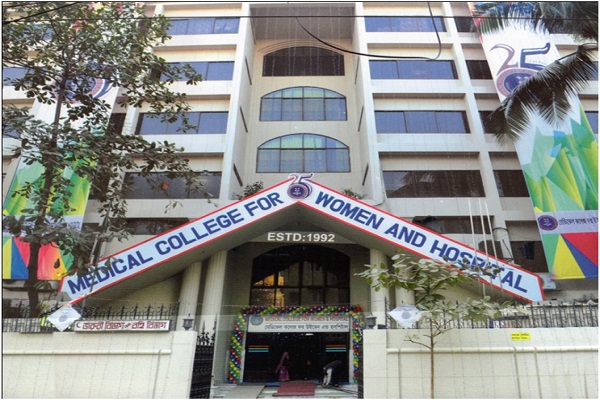
The Medical College for Women, Bangladesh (MCW), stands as a beacon of hope and progress in the realm of medical education, particularly for women, in Bangladesh. Established in 1992, MCW has been instrumental in shaping the landscape of healthcare and medical education in the country. Over the years, it has earned a stellar reputation for its commitment to excellence, gender inclusivity, and community-oriented healthcare practices.
The inception of Medical College for Women, Bangladesh marked a significant milestone in Bangladesh's healthcare sector, addressing the pressing need for more female physicians and healthcare professionals. Historically, women in Bangladesh have faced numerous challenges in accessing education and pursuing careers in fields such as medicine. MCW emerged as a pioneering institution dedicated to breaking down barriers and empowering women to pursue their aspirations in the medical field.
Located in Uttara, Dhaka, Medical College for Women, Bangladesh boasts state-of-the-art facilities, experienced faculty members, and a dynamic learning environment. The college offers a comprehensive range of undergraduate and postgraduate programs in medicine and allied health sciences, ensuring that students receive a holistic education grounded in both theoretical knowledge and practical experience.
With 500 bed super speciality hospital boast some best clinical experiences for students. The Medical College for Women, Bangladesh not only equips students with clinical skills and medical knowledge but also instills in them a sense of social responsibility and empathy towards patients. Through various outreach programs and community health initiatives,
Its curriculum is designed to meet the evolving needs of the healthcare industry while fostering critical thinking, research skills, and ethical values among students. The college offers specialized training programs in areas such as obstetrics and gynecology, pediatrics, internal medicine, surgery, and public health, enabling students to pursue their interests and excel in their chosen fields.
In addition to academic excellence, Medical College for Women, Bangladesh places a strong emphasis on research and innovation. Faculty members and students are actively involved in conducting research projects, publishing scholarly articles, and participating in national and international conferences. By promoting a culture of inquiry and discovery, Its contributes to the advancement of medical knowledge and the development of innovative healthcare solutions.
Medical College for Women, Bangladesh commitment to gender equality and women's empowerment extends beyond the classroom. The college provides a supportive and inclusive learning environment where female students can thrive and fulfill their potential without facing discrimination or barriers based on gender. Through mentorship programs, career guidance, and networking opportunities, MCW empowers women to become leaders in the healthcare profession and agents of positive change in their communities.
As a testament to its dedication to excellence, the colleges has earned accreditation from prestigious medical regulatory bodies and affiliations with leading healthcare institutions both nationally and internationally. The college's graduates are highly sought after by hospitals, clinics, and healthcare organizations across Bangladesh and beyond, reflecting the caliber of education and training they receive at Medical College for Women, Bangladesh.
Looking ahead, Medical College for Women, Bangladesh remains committed to its mission of advancing healthcare, promoting gender equality, and empowering future generations of medical professionals. Through continued innovation, collaboration, and dedication to excellence, MCW will continue to be a catalyst for positive change in the healthcare sector and a beacon of hope for women pursuing careers in medicine in Bangladesh and beyond.
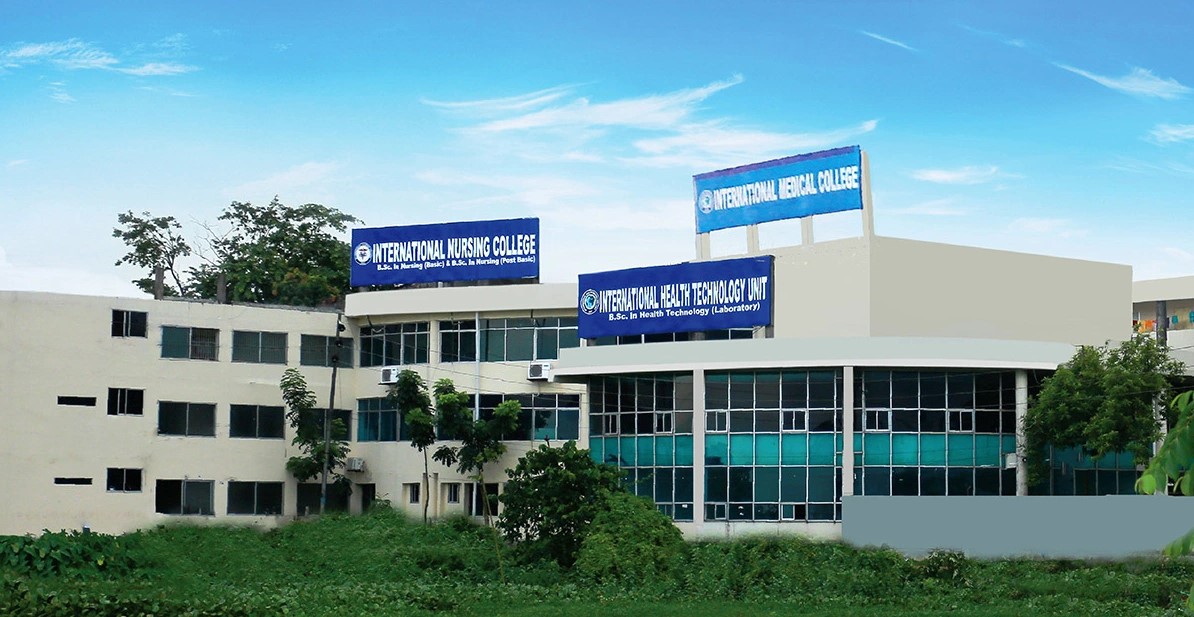
International Medical College (IMC) in Bangladesh stands as a beacon of medical education in South Asia. Established in the year 2000, International Medical College has been committed to producing competent and compassionate medical professionals who can cater to the healthcare needs of Bangladesh and beyond. With its state-of-the-art facilities, experienced faculty, and a comprehensive curriculum, IMC has earned recognition both nationally and internationally.
Situated in the heart of Bangladesh, in the city of Gazipur, International Medical College offers a conducive environment for learning and research. The college is affiliated with the University of Dhaka, ensuring that its programs meet the rigorous standards set by one of the country's premier educational institutions. Furthermore, International Medical College is recognized by the Bangladesh Medical and Dental Council (BMDC), which underscores its commitment to quality education and adherence to regulatory requirements.
One of the hallmarks of International Medical College is its faculty, comprising highly qualified professors, associate professors, and assistant professors who are experts in their respective fields. They not only impart knowledge but also serve as mentors, guiding students through their academic journey and helping them develop the skills necessary to excel in their profession.
With 650 super speciality bed hospital, International Medical College offers some of the best clinical rotations and experience to its students. The curriculum at International Medical College is designed to provide students with a strong foundation in medical science while also emphasizing practical skills and clinical experience. From the pre-clinical years to the clinical rotations, students are exposed to a diverse range of medical specialties, ensuring that they graduate with a well-rounded education. The college also places a strong emphasis on research, encouraging students and faculty members to engage in scientific inquiry and contribute to the body of knowledge in medicine.
The college boasts modern facilities, including well-equipped laboratories, libraries, and lecture halls, providing students with the resources they need to succeed. Furthermore, IMC has affiliations with several hospitals and healthcare institutions across Bangladesh, where students can gain hands-on experience under the supervision of experienced clinicians.
International Medical College has received accreditation from renowned international bodies, attesting to the quality of its programs and infrastructure. Moreover, IMC has forged partnerships with leading medical institutions and universities around the world, facilitating collaboration and exchange programs that enrich the educational experience of its students.
Despite its many achievements, it remains dedicated to continuous improvement. The college regularly reviews and updates its curriculum to reflect advances in medical science and changes in healthcare delivery. It also invests in faculty development programs to ensure that its educators remain at the forefront of medical education.
Looking ahead, International Medical College is poised to play a pivotal role in shaping the future of healthcare in Bangladesh and beyond. With its unwavering commitment to excellence, dedication to service, and spirit of innovation, the college stands as a beacon of hope for aspiring medical professionals and a testament to the transformative power of education.
In conclusion, International Medical College, Bangladesh, stands as a shining example of excellence in medical education. Through its rigorous academic programs, world-class faculty, and commitment to service, International Medical College has earned a reputation as a premier institution dedicated to producing competent and compassionate healthcare professionals. As Bangladesh continues to make strides in healthcare delivery and medical research, the college will undoubtedly remain at the forefront, shaping the future of medicine in the region and beyond.
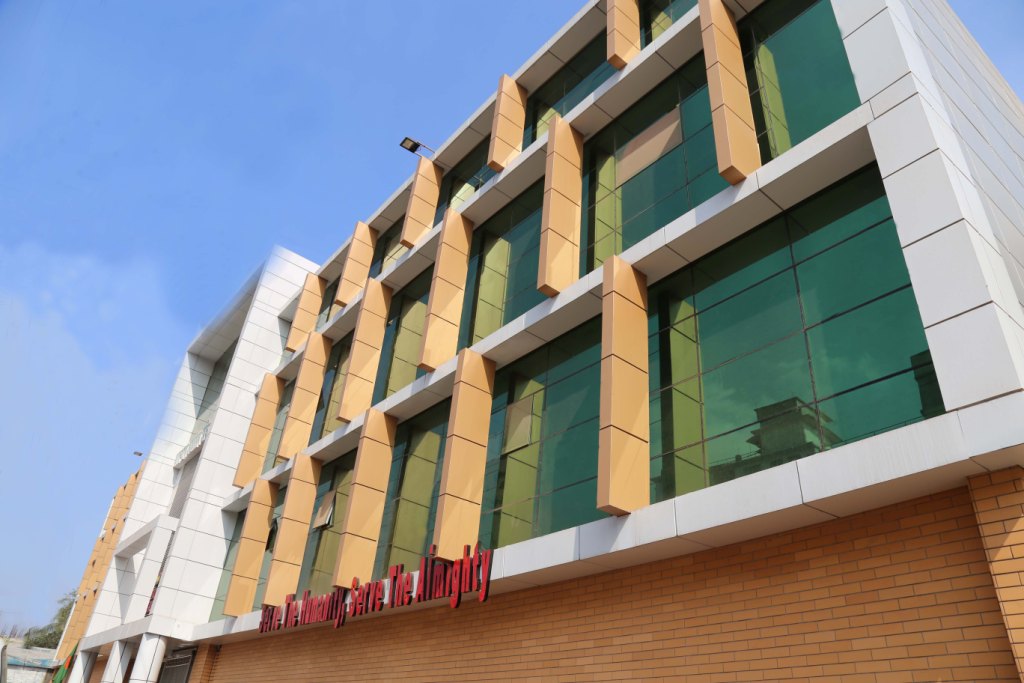
Tairunnessa Memorial Medical College & Hospital stands as a testament to Bangladesh's commitment to fostering excellence in medical education and healthcare. Situated in Gazipur, Bangladesh, Tairunnessa Medical College is one of the leading medical institutions in the country. Established with a vision to produce competent healthcare professionals and contribute significantly to the nation's health sector, TMC has consistently strived to uphold its standards of education, research, and service since its inception.
Tairunnessa Memorial Medical College & Hospital was founded in 2002 under the aegis of the Tairunnessa Memorial Medical Centre Trust. The college is named after Begum Tairunnessa, a renowned social worker and philanthropist known for her contributions to healthcare and education in Bangladesh. With a noble mission to provide quality medical education accessible to aspiring students, the institution began its journey with determination and dedication.
Tairunnessa Memorial Medical College & Hospital boasts state-of-the-art infrastructure and modern facilities conducive to both academic and extracurricular activities. The college campus encompasses spacious lecture halls, well-equipped laboratories, a vast library stocked with a rich collection of medical literature, and comfortable hostel accommodation for students. Moreover, TMC is furnished with advanced medical equipment, enabling students to gain practical exposure and hands-on experience in various clinical disciplines.
At Tairunnessa Medical College, academic excellence is prioritized through a comprehensive curriculum designed to impart theoretical knowledge, practical skills, and ethical values essential for medical practice.
The undergraduate program leading to the degree of Bachelor of Medicine and Bachelor of Surgery (MBBS) spans five years and includes a compulsory one-year internship period. Additionally, Tairunnessa Memorial Medical College & Hospital provides postgraduate courses in various specialties, enabling medical professionals to pursue advanced training and specialization in their respective fields.
Tairunnessa Memorial Medical College & Hospital Clinical is having 500 bed hospital complex and its training forms an integral part of medical education, Tairunnessa Medical College ensures that students receive comprehensive clinical exposure under the guidance of experienced clinicians and specialists. The college is affiliated with Tairunnessa Memorial Medical Centre, a tertiary care hospital equipped with modern medical facilities and staffed by competent healthcare professionals. Through clinical rotations and supervised patient care, students gain valuable insights into various medical specialties, diagnoses, and treatment modalities, thereby preparing them for the challenges of clinical practice.
Tairunnessa Medical College promotes a culture of research and innovation among its faculty and students, encouraging them to undertake scholarly projects and participate in scientific endeavors. The college supports research initiatives in diverse areas of medical science, ranging from basic biomedical research to clinical trials and epidemiological studies. By fostering a conducive environment for inquiry and discovery, it contributes to the generation of new knowledge and the development of evidence-based medical practices.
Tairunnessa Memorial Medical College & Hospital is recognized by the Bangladesh Medical and Dental Council (BMDC) and affiliated with the University of Dhaka, ensuring that its academic programs adhere to national standards and regulations. The college's commitment to excellence in medical education and patient care has earned it accreditation and accolades from regulatory bodies and professional organizations. Moreover, TMC's graduates have made significant contributions to the healthcare sector, both nationally and internationally, garnering recognition for their clinical skills, expertise, and commitment to excellence.
Tairunnessa Memorial Medical College & Hospital stands as a beacon of excellence in medical education and healthcare in Bangladesh. With its unwavering dedication to academic rigor, clinical excellence, and community service, the college continues to nurture the next generation of healthcare professionals and shape the future of medicine in the country. As Bangladesh strives to address the evolving healthcare challenges and achieve universal health coverage, institutions like Tairunnessa Medical College play a vital role in realizing the nation's healthcare aspirations and fostering a healthier, more prosperous society.
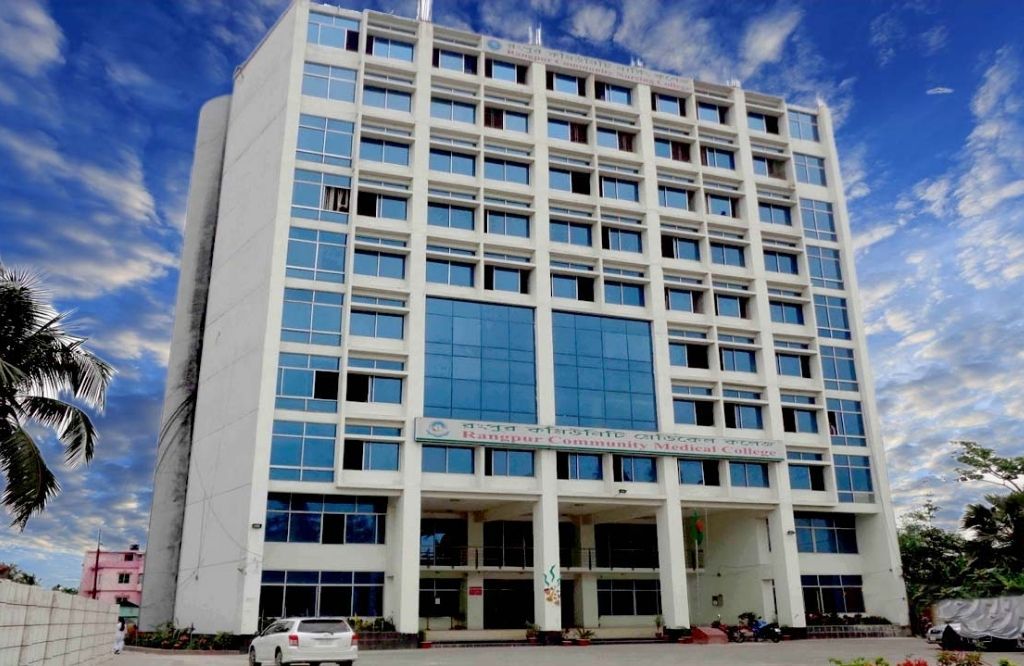
Rangpur Community Medical College (RCMC) is one of the premier medical institutions in Bangladesh, situated in Rangpur district. Established with the vision to provide quality medical education and healthcare services, it has emerged as a significant player in the healthcare and medical education landscape of Bangladesh. This article delves into the history, infrastructure, academic programs, faculty, facilities, and contributions of Rangpur Community Medical College to the healthcare sector in Bangladesh.
Rangpur Community Medical College was founded in 2008 with the aim of addressing the shortage of skilled healthcare professionals in northern Bangladesh. The institution was established under the supervision of Rangpur Community Medical College Trust, a non-profit organization committed to advancing medical education and healthcare services in the region.
Rangpur Community Medical College boasts modern infrastructure and state-of-the-art facilities to facilitate quality medical education and research. The college campus encompasses academic buildings, lecture halls, laboratories, libraries, and student accommodation facilities. The institution is equipped with advanced medical equipment and technology to provide hands-on training to students in various medical disciplines.
Rangpur Community Medical College offers undergraduate and postgraduate programs in medicine and allied health sciences. The undergraduate program, Bachelor of Medicine and Bachelor of Surgery (MBBS), is a five-year course designed to train medical students in clinical and theoretical aspects of medicine. The curriculum integrates classroom teaching, clinical rotations, and practical sessions to ensure comprehensive learning.
The college also offers postgraduate programs in various specialties, including Internal Medicine, Surgery, Pediatrics, Obstetrics and Gynecology, and others. These programs provide advanced training and specialization opportunities for medical graduates seeking to pursue careers in specialized fields of medicine.
Rangpur Community Medical College prides itself on its highly qualified and experienced faculty members who are dedicated to providing quality education and mentorship to students. The faculty comprises renowned medical professionals, clinicians, researchers, and academicians with expertise in various medical specialties. They employ innovative teaching methodologies and practical approaches to foster a conducive learning environment for students.
Rangpur Community Medical College offers 1000 bed hospital to its students for clinical experience. Clinical training is an integral component of medical education at Rangpur Community Medical College. The institution has established affiliations with several renowned hospitals and healthcare institutions in the region to provide clinical exposure and hands-on training to students. Through rotations and internships in these affiliated hospitals, students gain practical experience and develop essential clinical skills under the supervision of experienced healthcare professionals.
Rangpur Community Medical College emphasizes the importance of research and innovation in advancing medical knowledge and improving healthcare outcomes. The institution encourages faculty and students to engage in research activities and scholarly pursuits across various medical disciplines. Research projects, scientific publications, and academic conferences are integral components of the academic culture at Rangpur Community Medical College.
Rangpur Community Medical College plays a pivotal role in shaping the future of healthcare in Bangladesh through its commitment to excellence in medical education, research, and healthcare delivery. With its modern infrastructure, experienced faculty, comprehensive academic programs, and community-oriented approach, Rangpur Community Medical College continues to make significant contributions to the healthcare sector and the well-being of communities in northern Bangladesh. As it continues to grow and evolve, Rangpur Community Medical College remains dedicated to its mission of producing competent healthcare professionals and addressing the healthcare challenges of the region.
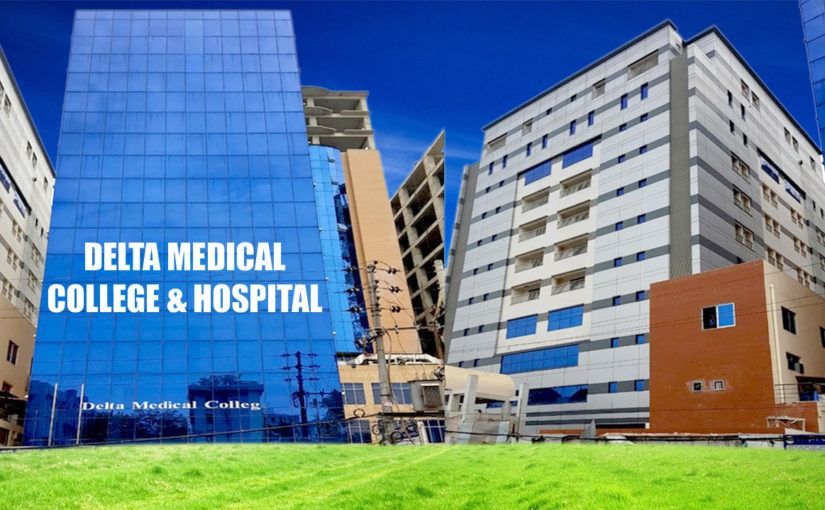
Delta Medical College, located in Bangladesh, stands as a beacon of medical education and healthcare service within the country. Established with a vision to impart quality medical education and produce competent healthcare professionals, Delta Medical College has emerged as a prominent institution in the region. Delta Medical College was established in the year 2006, with a commitment to excellence in medical education, research, and healthcare delivery. The college is affiliated with Dhaka University and recognized by the Bangladesh Medical and Dental Council (BMDC).
Delta Medical College offers undergraduate and postgraduate medical education programs. The undergraduate program leads to the award of the Bachelor of Medicine, Bachelor of Surgery (MBBS) degree upon successful completion of the curriculum. The college also provides postgraduate training in various medical specialties, catering to the needs of aspiring medical professionals seeking advanced education and training.
The faculty members at Delta Medical College comprise experienced professionals, renowned clinicians, and esteemed researchers who are committed to imparting knowledge and skills to the students. The college boasts a diverse faculty with expertise in various medical disciplines, ensuring comprehensive coverage of the curriculum and fostering a conducive learning environment.
Delta Medical College is equipped with state-of-the-art infrastructure and modern facilities to facilitate effective teaching, learning, and research activities. The college campus encompasses well-equipped lecture halls, laboratories, libraries, and academic resources essential for medical education and training. Additionally, the college maintains affiliations with reputed hospitals and healthcare institutions where students receive clinical exposure and hands-on training under the supervision of experienced practitioners.
Research and innovation are integral components of the academic culture at Delta Medical College. The institution encourages faculty members and students to engage in research activities aimed at advancing medical knowledge, addressing healthcare challenges, and exploring innovative solutions to improve patient care outcomes. The college supports research initiatives through funding, resources, and collaborative partnerships with national and international institutions.
Delta Medical College, 350 bedded multidisciplinary hospital places great emphasis on clinical training and internship experiences to prepare students for real-world medical practice. Through affiliations with leading hospitals and healthcare facilities, students have the opportunity to gain practical exposure across various medical specialties, interact with patients, and apply theoretical knowledge in clinical settings. The internship program enables students to develop clinical skills, ethical values, and professional competence under the guidance of experienced healthcare professionals.
The alumni network of Delta Medical College comprises distinguished healthcare professionals who have excelled in various fields of medicine and healthcare. Alumni play an integral role in mentoring students, sharing professional insights, and contributing to the advancement of medical education and practice. The college fosters strong ties with its alumni community, organizing reunions, seminars, and networking events to facilitate ongoing engagement and collaboration.
Delta Medical College stands as a premier institution of medical education and healthcare in Bangladesh, committed to excellence, innovation, and service to humanity. With its comprehensive academic programs, distinguished faculty, modern infrastructure, and commitment to research and community engagement, Delta Medical College continues to shape the future of healthcare by nurturing competent and compassionate healthcare professionals who uphold the highest standards of medical practice and ethics.
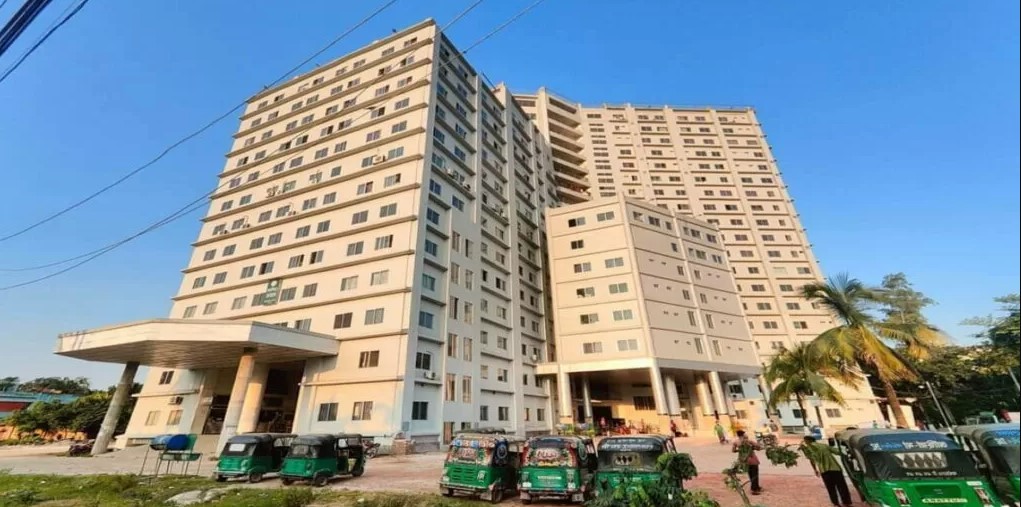
TMSS Medical College, located in Bogura, Bangladesh, is a prominent institution in the country's healthcare and medical education landscape. Established with the aim of providing quality medical education and healthcare services, TMSS Medical College has emerged as a vital hub for training future physicians and contributing to the healthcare sector of Bangladesh.
TMSS Medical College was founded in 2008 under the Thengamara Mohila Sabuj Sangha (TMSS), a renowned non-governmental organization in Bangladesh. The organization has been active in various fields, including healthcare, education, and socio-economic development, since its inception in 1980. The establishment of TMSS Medical College reflects its commitment to addressing the healthcare needs of the population by producing skilled medical professionals.
TMSS Medical College offers undergraduate medical education leading to the degree of Bachelor of Medicine, Bachelor of Surgery (MBBS). The curriculum is designed to meet international standards and is constantly updated to incorporate advancements in medical science and technology. The college emphasizes a holistic approach to medical education, integrating theoretical knowledge with practical clinical experience.
The faculty members at TMSS Medical College comprise experienced medical professionals, educators, and researchers dedicated to imparting knowledge and skills to the students. They bring a wealth of clinical experience and academic expertise to the classroom and clinical settings. The staff members, including administrative personnel and support staff, play a crucial role in ensuring the smooth functioning of the college and hospital.
TMSS Medical College boasts modern infrastructure and state-of-the-art facilities to support teaching, learning, and research activities. The campus includes well-equipped lecture halls, laboratories, libraries, and computer facilities. The college also has a teaching hospital, which serves as a training ground for students and provides healthcare services to the community.
Clinical training is an integral part of the medical curriculum at TMSS Medical College which has 850 bed hospital for students for their clinical exposure. Students have the opportunity to gain hands-on experience in various clinical departments under the guidance of experienced faculty members and healthcare professionals. The teaching hospital affiliated with the college offers a wide range of clinical services, exposing students to diverse medical conditions and treatment modalities.
TMSS Medical College encourages research and innovation among faculty members and students to advance medical knowledge and improve healthcare outcomes. The college supports research initiatives across various disciplines and provides resources for conducting studies and publishing research findings. Research activities contribute to the academic growth of the institution and facilitate the development of evidence-based medical practices.
TMSS Medical College is recognized by the Bangladesh Medical and Dental Council (BMDC) and affiliated with the University of Rajshahi. The college maintains high standards of quality in medical education and is committed to continuous improvement and accreditation processes. Graduates of TMSS Medical College are eligible to pursue postgraduate training and licensure examinations in Bangladesh and other countries.
TMSS Medical College plays a significant role in shaping the future of healthcare in Bangladesh. Through its commitment to excellence in education, research, and healthcare delivery, the college contributes to the development of skilled healthcare professionals and the improvement of healthcare services nationwide. With its focus on innovation, community engagement, and academic excellence, TMSS Medical College remains a beacon of hope for the advancement of medical education and healthcare in Bangladesh.
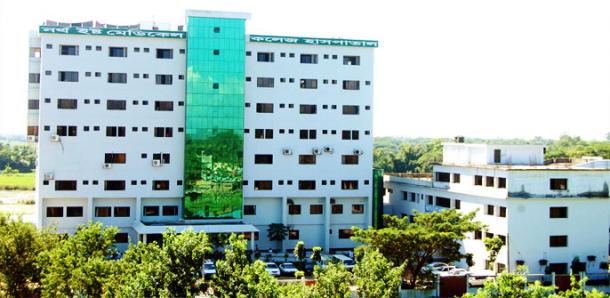
North East Medical College is a prominent medical institution located in Sylhet, Bangladesh. Established in 1996, it has evolved into a prestigious center for medical education, research, and healthcare delivery in the country. NEMC is committed to producing competent healthcare professionals and contributing to the improvement of healthcare standards in Bangladesh and beyond.
North East Medical College was founded by a group of philanthropists with a vision to establish a top-tier medical institution in the northeastern region of Bangladesh. Recognizing the need for quality medical education and healthcare services in Sylhet, they embarked on a mission to establish a medical college that would cater to the needs of the local community and beyond.
North East Medical College boasts state-of-the-art infrastructure and modern facilities to support its academic and clinical activities. The college campus is equipped with spacious lecture halls, laboratories, libraries, and administrative buildings. The institution also has well-equipped anatomy, physiology, biochemistry, and pathology laboratories to facilitate hands-on learning experiences for students.
The college campus also includes student dormitories, faculty housing, recreational facilities, and a cafeteria, providing a conducive environment for learning and living. Additionally, North East Medical College has established affiliations with leading hospitals and healthcare institutions in Sylhet to provide clinical training opportunities for its students, it also offers 800 bed teaching hospital for its student.
North East Medical College offers undergraduate and postgraduate programs in various disciplines of medicine and healthcare. The undergraduate program leads to the award of Bachelor of Medicine, Bachelor of Surgery (MBBS) degree upon successful completion of the curriculum.
The MBBS program at North East Medical College is designed to impart comprehensive medical knowledge, clinical skills, and professional ethics to aspiring healthcare professionals. The curriculum encompasses basic medical sciences, clinical medicine, surgery, obstetrics and gynecology, pediatrics, and other specialized areas of study. Students undergo rigorous theoretical instruction, practical training, and clinical rotations to develop proficiency in diagnosing and treating a wide range of medical conditions.
In addition to the MBBS program, North East Medical College offers postgraduate courses and residency training programs in various specialties and subspecialties of medicine and surgery. These programs provide opportunities for doctors to pursue advanced training, acquire specialized skills, and contribute to medical research and innovation.
North East Medical College prides itself on its highly qualified faculty members who are renowned experts in their respective fields of specialization. The faculty comprises experienced clinicians, educators, and researchers who are dedicated to providing high-quality education and mentorship to students.
In addition to the core faculty, NEMC invites visiting professors and guest lecturers from reputed institutions to enrich the learning experience and expose students to diverse perspectives and approaches in medicine and healthcare.
Research and innovation are integral components of the academic culture at NEMC. The institution encourages faculty members, students, and researchers to engage in scholarly activities, scientific inquiry, and collaborative research projects aimed at advancing medical knowledge and improving healthcare outcomes.
NEMC supports research initiatives in various areas of biomedical sciences, clinical medicine, public health, and healthcare management. The college provides research grants, laboratory facilities, and technical assistance to facilitate research endeavors and foster a culture of academic excellence and innovation.
Furthermore, North East Medical College encourages the dissemination of research findings through scientific publications, presentations at conferences, and participation in academic forums. By promoting a research-driven approach to healthcare delivery, NEMC aims to contribute to the development of evidence-based practices and solutions to address the healthcare challenges facing Bangladesh and the global community.
North East Medical College stands as a beacon of excellence in medical education, research, and healthcare delivery in Bangladesh. With its commitment to academic rigor, clinical excellence, and community engagement, NEMC continues to uphold its mission of producing competent healthcare professionals and advancing the frontiers of medical knowledge and innovation.
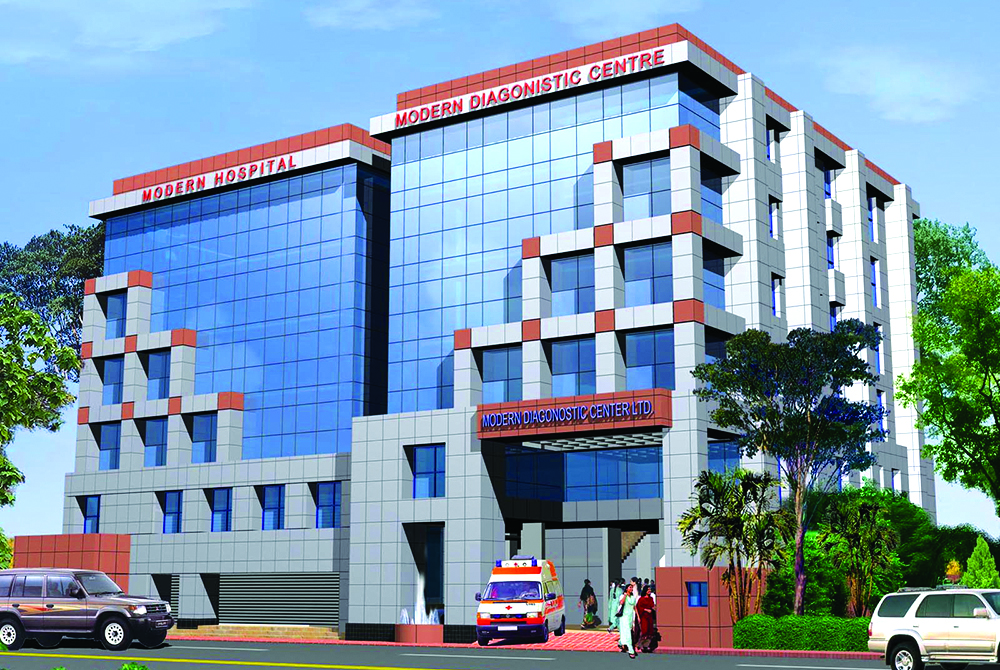
Anwer Khan Modern Medical College (AKMMC) stands as a beacon of medical education and healthcare provision in Bangladesh. Established in 2008, AKMMC has swiftly become one of the premier medical institutions in the country, renowned for its commitment to excellence in medical education, research, and healthcare delivery. With a strong emphasis on innovation, integrity, and compassion, AKMMC has garnered acclaim both nationally and internationally for its contributions to medical science and healthcare.
Anwer Khan Modern Medical College was founded with a vision to produce competent and compassionate healthcare professionals who can address the evolving healthcare needs of Bangladesh and beyond. Named after the renowned philanthropist and industrialist Anwer Khan, the college is dedicated to upholding his legacy of service to humanity.
Situated in Dhanmondi, Dhaka, Anwer Khan Modern Medical College boasts state-of-the-art infrastructure and facilities conducive to fostering a dynamic learning environment. The college campus encompasses modern lecture halls, well-equipped laboratories, a vast library stocked with a plethora of medical literature, and cutting-edge research facilities. Moreover, the college is affiliated with Anwer Khan Modern Hospital, a tertiary care hospital that provides students with hands-on clinical experience under the guidance of seasoned medical professionals.
Anwer Khan Modern Medical College offers a comprehensive range of academic programs aimed at producing healthcare professionals proficient in various medical disciplines. The college provides undergraduate programs leading to Bachelor of Medicine, Bachelor of Surgery (MBBS) degrees, as well as postgraduate programs in various specialties. The curriculum is meticulously designed to integrate theoretical knowledge with practical application, thereby ensuring that students develop a holistic understanding of medical science and clinical practice.
The faculty at AKMMC comprises a diverse team of highly qualified and experienced educators, clinicians, and researchers who are dedicated to nurturing the next generation of medical professionals. With expertise spanning various medical specialties, the faculty members serve as mentors and role models, inspiring students to pursue excellence in their academic and professional endeavors. Moreover, AKMMC actively promotes research and innovation, providing students and faculty with opportunities to engage in groundbreaking research projects aimed at advancing medical knowledge and improving patient care.
Clinical training forms an integral part of the curriculum and the student of the college gained hands-on experience through rotations in various departments of 750 super modern Anwer Khan Modern Hospital equipped with ultra-modern lab. Under the supervision of experienced clinicians, students actively participate in patient care, diagnostic procedures, and treatment interventions, thereby honing their clinical skills and judgment. Furthermore, the college offers a comprehensive internship program that enables graduates to apply their knowledge and skills in real-world clinical settings, preparing them for the rigors of professional practice.
AKMMC's commitment to excellence has earned it recognition and accreditation from prestigious national and international regulatory bodies. The college is affiliated with the University of Dhaka and is recognized by the Bangladesh Medical and Dental Council (BMDC) and the Ministry of Health and Family Welfare, Bangladesh. Moreover, AKMMC maintains partnerships and collaborations with leading academic institutions and healthcare organizations worldwide, facilitating exchange programs, research collaborations, and knowledge sharing initiatives.
Anwer Khan Modern Medical College stands as a shining example of excellence in medical education, research, and healthcare provision. With its unwavering commitment to academic integrity, clinical excellence, and compassionate care, AKMMC continues to play a pivotal role in shaping the future of healthcare in Bangladesh and beyond. As it strides forward on its journey of innovation and service, AKMMC remains dedicated to its mission of producing competent and compassionate healthcare professionals who are equipped to meet the evolving challenges of the healthcare landscape.
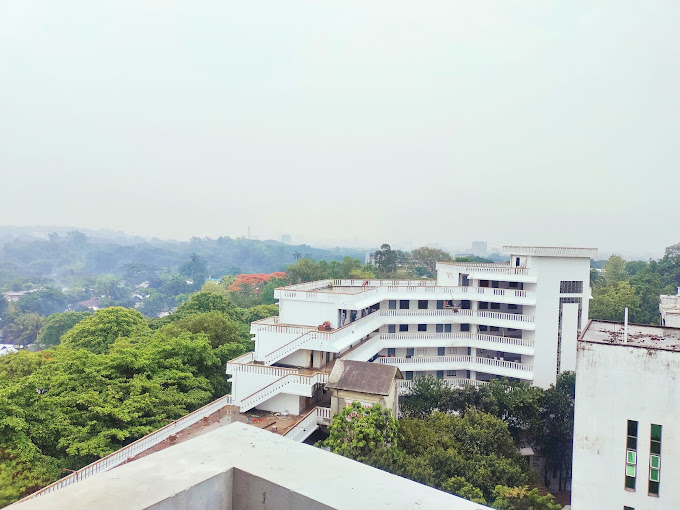
The Institute of Applied Health Sciences (IAHS) in Bangladesh stands as a beacon of progress and excellence in the realm of healthcare education and research within the country and beyond. Established with a vision to cultivate a cadre of skilled healthcare professionals and to advance scientific knowledge in the field of health sciences, IAHS has emerged as a pivotal institution shaping the future of healthcare in Bangladesh. In this comprehensive exploration, we delve into the ethos, history, educational offerings, research endeavours, and societal impact of the Institute of Applied Health Sciences. The institute envisions becoming a premier centre of excellence in health sciences education, research, and healthcare delivery Established in 1989, IAHS was conceived as a response to the growing demand for highly skilled healthcare professionals in Bangladesh Institute of Applied Health Sciences offers a diverse array of academic programs designed to equip students with the knowledge, skills, and competencies necessary to excel in various domains of healthcare. These programs span undergraduate MBBS graduate, and postgraduate levels and encompass disciplines such as medicine, nursing, public health, allied health sciences, and more. The curriculum is meticulously crafted to integrate theoretical knowledge with practical training, ensuring that graduates are well-prepared to address the complex challenges facing the healthcare sector. Clinical training is an integral part of the medical courses and the student of the college gained hands-on experience through rotations in various departments of 250 bed Bangabandhu Memorial Hospital.
Central to the success of IAHS is its distinguished faculty and staff comprising seasoned educators, researchers, clinicians, and industry experts. Renowned for their expertise and dedication, the faculty members at IAHS are committed to nurturing the intellectual growth and professional development of their students. Through their mentorship, guidance, and scholarly contributions, they inspire a culture of academic excellence and inquiry-driven learning within the institute.
Institute of Applied Health Sciences serves as a hub of scientific inquiry and innovation, fostering a dynamic research ecosystem aimed at advancing the frontiers of knowledge in health sciences. Faculty members and students engage in cutting-edge research across a myriad of disciplines, addressing pressing health issues, exploring novel treatment modalities, and contributing to the evidence base that informs clinical practice and health policy. Through collaborative partnerships with national and international institutions.
Institute of Applied Health Sciences has garnered widespread acclaim and recognition for its contributions to the advancement of healthcare education, research, and practice. Its alumni, comprising leaders and trailblazers in the healthcare arena, serve as ambassadors of the institute's values and ethos, driving positive change and innovation in their respective spheres of influence. Through its unwavering commitment to excellence and its enduring legacy of service, IAHS continues to shape the future of healthcare in Bangladesh and beyond, leaving an indelible mark on the fabric of society.
Institute of Applied Health Sciences stands as a testament to the transformative power of education, research, and service in advancing the cause of health and well-being. As it charts a course towards the future, IAHS remains steadfast in its commitment to excellence, innovation, and social responsibility, embodying the highest ideals of academic endeavor and societal impact in pursuit of a healthier, more equitable world.
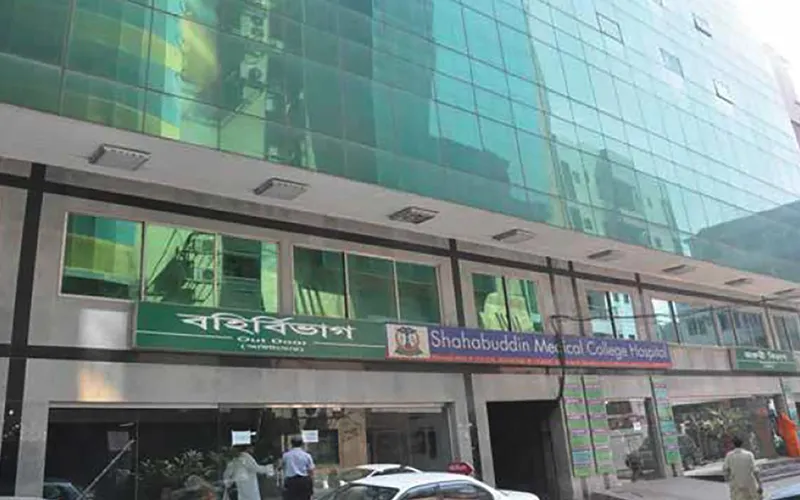
Shahabuddin Medical College, Bangladesh, is a prestigious institution dedicated to medical education and healthcare services. Established with a vision to produce competent healthcare professionals and contribute to the advancement of medical science, Shahabuddin Medical College has emerged as a leading institution in Bangladesh. Shahabuddin Medical College was founded in the year 2003 in Dhaka, the capital city of Bangladesh. The college was established with the noble intention of addressing the growing demand for qualified medical professionals in the country and improving the healthcare sector. Named after a renowned figure in the medical field, the college carries forward the legacy of excellence and commitment to service.
Shahabuddin Medical College boasts state-of-the-art infrastructure and modern facilities to facilitate learning and research. The college campus comprises well-equipped lecture halls, laboratories, libraries, and research centers. It also houses teaching hospital of 500 bed with modern equip lab, where students gain hands-on clinical experience under the guidance of experienced faculty members and healthcare professionals.
The college is committed to providing a conducive learning environment for students, with facilities such as well-maintained classrooms, audiovisual aids, computer labs, and internet connectivity. The library is stocked with a vast collection of medical literature, journals, and research publications to support academic endeavors and promote scholarly activities among students and faculty.
Shahabuddin Medical College offers undergraduate and postgraduate programs in various medical disciplines, including Medicine, Surgery, Pediatrics, Obstetrics and Gynecology, Psychiatry, and others. The undergraduate program leads to the award of Bachelor of Medicine, Bachelor of Surgery (MBBS) degree upon successful completion of the curriculum and passing the relevant examinations.
The curriculum is designed to provide a comprehensive understanding of medical science, clinical skills, and ethical principles. It integrates theoretical knowledge with practical training to prepare students for the challenges of the healthcare profession. The college emphasizes a holistic approach to medical education, focusing not only on academic excellence but also on the development of interpersonal skills, professionalism, and ethical values.
Shahabuddin Medical College prides itself on its highly qualified and experienced faculty members who are experts in their respective fields. The faculty comprises renowned medical professionals, researchers, and scholars dedicated to imparting knowledge, mentoring students, and advancing medical science through research and innovation.
The college also has a competent team of administrative and support staff who work tirelessly to ensure the smooth functioning of academic and administrative activities. Their dedication and commitment contribute significantly to the success and reputation of the institution.
Research and innovation are integral components of Shahabuddin Medical College's academic culture. The college encourages faculty members and students to engage in research activities, explore new frontiers of medical science, and contribute to the body of knowledge in their respective fields.
The college provides support and resources for research endeavors, including funding, laboratory facilities, and collaboration opportunities with other institutions and research organizations. It promotes interdisciplinary research initiatives and encourages the dissemination of research findings through publications, conferences, and academic forums.
The alumni network of Shahabuddin Medical College is a testament to the institution's legacy and impact in the field of medicine. Graduates of the college occupy key positions in healthcare institutions, academic institutions, and research organizations across the globe. They serve as ambassadors of the college's values and principles, upholding its tradition of excellence and making significant contributions to the advancement of medical science and patient care.
Shahabuddin Medical College, Bangladesh, stands as a beacon of excellence in medical education, research, and healthcare services. With its commitment to academic rigor, ethical values, and social responsibility, the college continues to nurture the next generation of healthcare professionals and contribute to the well-being of society. As it continues to evolve and expand its horizons, Shahabuddin Medical College remains dedicated to its mission of healing, teaching, and serving humanity.
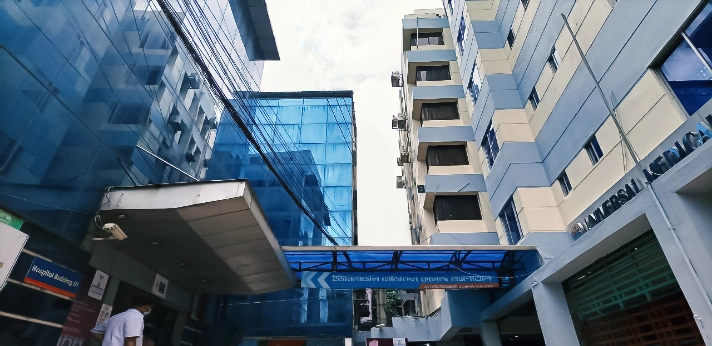
Universal Medical College (UMC) is a distinguished institution in Bangladesh dedicated to providing high-quality medical education, fostering research excellence, and delivering compassionate healthcare services to the community. Founded with a vision to address the country's healthcare needs and contribute to global medical advancements, UMC has emerged as a leading center of medical learning and innovation.
Established in 2013, UMC has since been committed to upholding the highest standards of academic excellence and professional integrity. UMC's sprawling campus encompasses modern academic facilities, state-of-the-art laboratories, well-equipped classrooms, and a teaching hospital that serves as a vital resource for clinical training and patient care.
Universal Medical College mission is its dedication to producing competent, compassionate, and ethical healthcare professionals who are equipped to meet the evolving challenges of the medical profession. The institution offers a comprehensive range of academic programs, including undergraduate and postgraduate degrees in medicine, dentistry, nursing, pharmacy, and allied health sciences. Universal Medical College rigorous curriculum is designed to provide students with a solid foundation in basic sciences, clinical skills, research methodologies, and ethical principles, ensuring that graduates are well-prepared to excel in their chosen fields.
Universal Medical College takes pride in its distinguished faculty, comprising experienced clinicians, researchers, and educators who are committed to nurturing the next generation of healthcare leaders. Through mentorship, research supervision, and hands-on clinical training, faculty members play a pivotal role in shaping the professional development of students and instilling in them a commitment to lifelong learning and patient-centered care.
One of the hallmarks of Universal Medical College is its emphasis on research and scholarly inquiry. The institution actively promotes research activities across various disciplines, providing students and faculty with opportunities to engage in meaningful research projects, publish their findings in peer-reviewed journals, and contribute to the advancement of medical knowledge. UMC's research initiatives span a wide range of areas, including clinical medicine, public health, biomedical sciences, and translational research, with a particular focus on addressing the healthcare needs of underserved populations and tackling prevalent health challenges in Bangladesh and beyond.
In addition to its academic and research endeavors, Universal Medical College operates a full-fledged 250 bed teaching hospital that serves as a vital component of its healthcare delivery system and for student’s clinical rotation. The hospital provides comprehensive medical services across a range of specialties, including internal medicine, surgery, pediatrics, obstetrics, gynecology, cardiology, neurology, and more. Equipped with advanced medical technology, state-of-the-art diagnostic facilities, and a dedicated team of healthcare professionals, the hospital offers compassionate and evidence-based care to patients from diverse socio-economic backgrounds.
Universal Medical College commitment to excellence extends beyond the confines of its campus, as the institution actively engages with the community through various outreach programs, health camps, and public awareness initiatives. UMC's impact extends far beyond the borders of Bangladesh, as the institution actively participates in international collaborations, research partnerships, and academic exchanges with renowned institutions and organizations around the world. Through these collaborations, UMC seeks to leverage global expertise, exchange best practices, and foster cross-cultural understanding in the pursuit of advancing medical education, research, and patient care on a global scale.
Universal Medical College stands as a beacon of excellence and innovation in medical education, research, and healthcare delivery in Bangladesh and beyond. With its unwavering commitment to academic integrity, clinical excellence, and social responsibility, UMC continues to play a transformative role in shaping the future of healthcare and improving the lives of individuals and communities around the world.
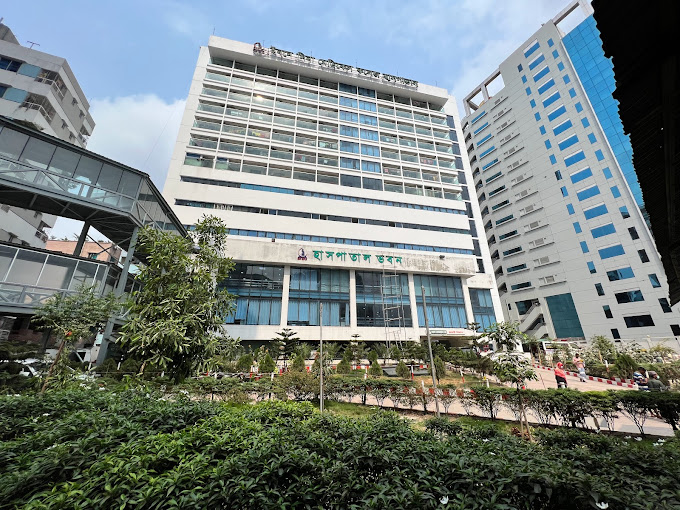
Ibn Sina Medical College, located in Dhaka, Bangladesh, stands as a prominent institution in the field of medical education and healthcare within the country and beyond. Established to address the growing need for qualified medical professionals and to contribute to the healthcare sector, Ibn Sina Medical College has evolved into a center of excellence since its inception. In this comprehensive overview, we delve into the history, mission, academic programs, facilities, and contributions of Ibn Sina Medical College to the healthcare landscape of Bangladesh.
History and Establishment Ibn Sina Medical College was founded in 2005 by a group of dedicated individuals with a vision to establish a medical institution that would produce competent healthcare professionals capable of addressing the healthcare challenges of Bangladesh. Named after the renowned Persian polymath, Abu Ali Ibn Sina (Avicenna), the college embodies a commitment to excellence and knowledge dissemination in the medical field.
Ibn Sina Medical College offers a range of undergraduate and postgraduate programs designed to cater to the diverse needs of aspiring healthcare professionals. The undergraduate program leads to the Bachelor of Medicine, Bachelor of Surgery (MBBS) degree, which is recognized by the Bangladesh Medical and Dental Council (BMDC) and affiliated with the University of Dhaka.
The curriculum is meticulously crafted to integrate theoretical knowledge with practical skills, ensuring that students receive a comprehensive medical education that prepares them for the challenges of clinical practice. Emphasis is placed on evidence-based medicine, ethics, communication skills, and patient-centred care.
In addition to the MBBS program, Ibn Sina Medical College offers postgraduate degrees and diploma courses in various specialties and subspecialties. These programs enable medical graduates to pursue advanced training and specialization in their areas of interest, fostering excellence and innovation in healthcare delivery.
Ibn Sina Medical College boasts a team of highly qualified faculty members comprising experienced clinicians, researchers, and educators. The faculty members are dedicated to providing exemplary guidance, mentorship, and support to students, fostering a conducive learning environment that promotes academic excellence and professional growth.
The college also employs skilled administrative and support staff who play a crucial role in ensuring the smooth functioning of academic and administrative processes, thereby facilitating the overall educational experience for students and faculty alike.
The campus of Ibn Sina Medical College is equipped with state-of-the-art facilities and infrastructure designed to facilitate teaching, learning, research, and clinical practice. The college houses well-equipped lecture halls, laboratories, libraries, and research centres where students can engage in hands-on learning and academic inquiry under the guidance of experienced faculty members.
The college is affiliated with a tertiary care hospital of 750 bed providing students with opportunities for clinical training and exposure to a wide range of medical conditions and treatment modalities. The hospital is equipped with modern medical equipment, diagnostic facilities, and specialized units, ensuring comprehensive healthcare services for patients and valuable learning experiences for students.
Research and innovation are integral components of Ibn Sina Medical College's academic culture, with faculty members and students actively engaged in research activities across various disciplines. The college encourages and supports research initiatives aimed at advancing medical knowledge, improving healthcare practices, and addressing pressing health challenges facing the community.
Through collaborations with national and international institutions, as well as participation in research conferences and publications, Ibn Sina Medical College contributes to the global body of medical knowledge and fosters a culture of innovation and inquiry among its students and faculty members.
Ibn Sina Medical College stands as a beacon of excellence in medical education, research, and healthcare delivery in Bangladesh. With its unwavering commitment to academic quality, ethical practice, and community engagement, the college continues to play a pivotal role in shaping the future of healthcare in the country and beyond. As it continues to evolve and innovate, Ibn Sina Medical College remains dedicated to its mission of producing competent, compassionate, and socially responsible healthcare professionals who will make a positive difference in the lives of individuals and communities.
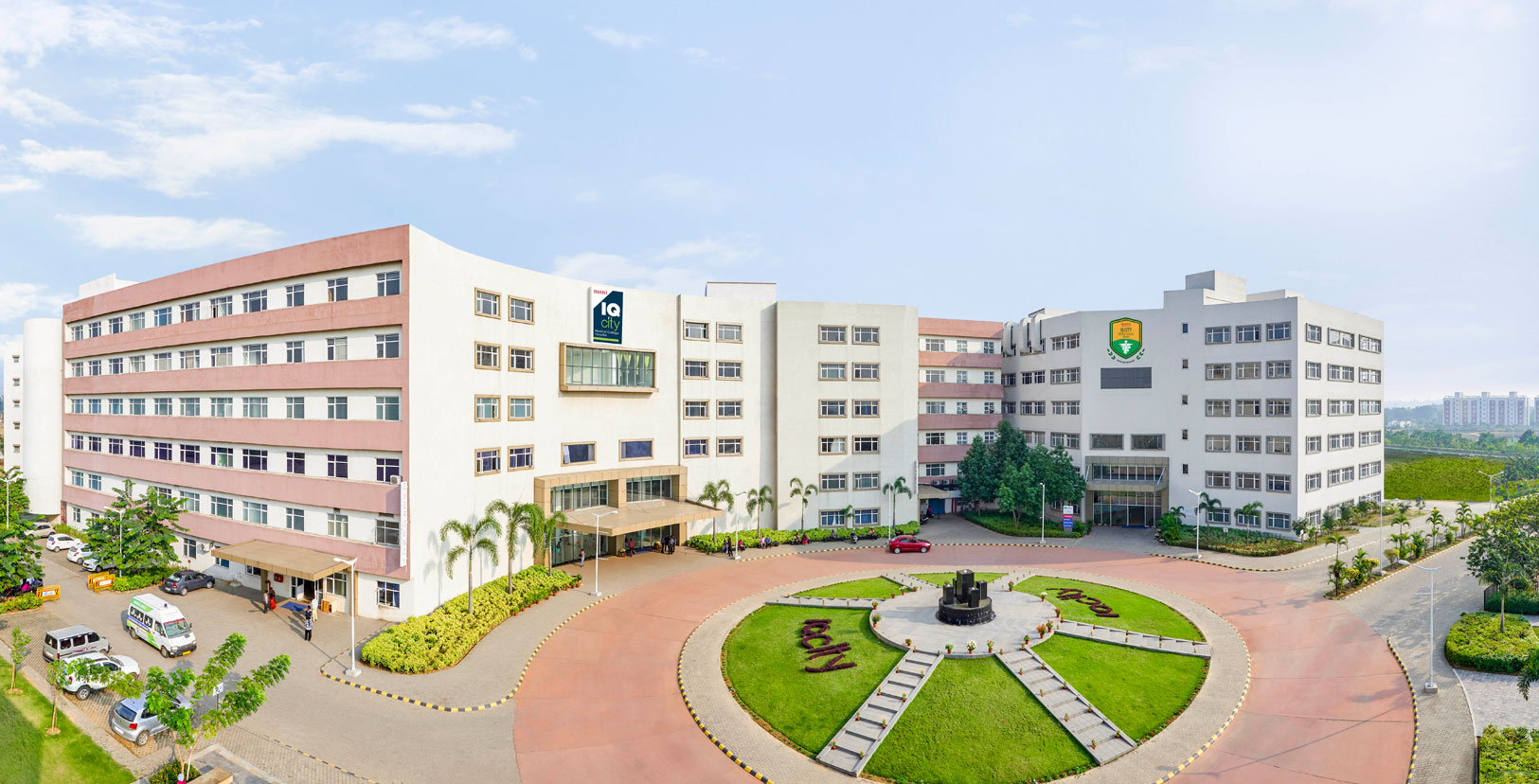
City Medical College, situated in Gazipur, Bangladesh, holds a significant position in the landscape of medical education and healthcare within the country. Established with a vision to impart quality medical education and produce competent healthcare professionals, City Medical College has been contributing to the healthcare sector since its inception. This comprehensive overview aims to delve into the history, mission, academic programs, facilities, and contributions of City Medical College to the healthcare sector of Bangladesh.
City Medical College was established in 2011, reflecting a concerted effort to address the growing demand for skilled healthcare professionals in Bangladesh. Founded by a group of visionary individuals, the college aims to provide a platform for aspiring medical students to pursue their academic and professional aspirations in the field of medicine. Since its inception, City Medical College has been committed to upholding the highest standards of medical education and clinical practice, thereby contributing to the overall healthcare landscape of the country.
City Medical College offers a range of undergraduate and postgraduate programs designed to cater to the diverse needs of aspiring healthcare professionals. The undergraduate program leads to the Bachelor of Medicine, Bachelor of Surgery (MBBS) degree, which is recognized by the Bangladesh Medical and Dental Council (BMDC) and affiliated with reputed universities.
The curriculum is carefully structured to integrate theoretical knowledge with practical clinical skills, ensuring that students receive a comprehensive medical education that prepares them for the challenges of clinical practice. Emphasis is placed on evidence-based medicine, critical thinking, communication skills, and ethical practice, enabling students to become competent and compassionate physicians.
In addition to the MBBS program, City Medical College offers postgraduate degrees and diploma courses in various specialties and subspecialties. These programs provide medical graduates with opportunities for advanced training, specialization, and research, thereby fostering excellence and innovation in healthcare delivery.
City Medical College boasts a dedicated team of faculty members comprising experienced clinicians, researchers, and educators. The faculty members are committed to providing exemplary teaching, mentorship, and support to students, fostering a conducive learning environment that promotes academic excellence and professional growth.
The campus of City Medical College is equipped with modern facilities and infrastructure designed to support teaching, learning, research, and clinical practice. The college features well-equipped lecture halls, laboratories, libraries, and research centers where students can engage in hands-on learning and academic inquiry under the guidance of experienced faculty members.
City Medical College is affiliated with a tertiary care 400 bed hospital, providing students with opportunities for clinical training and exposure to a wide range of medical conditions and treatment modalities. The hospital is equipped with state-of-the-art medical equipment, diagnostic facilities, and specialized units, ensuring comprehensive healthcare services for patients and valuable learning experiences for students.
Research and innovation are integral components of City Medical College's academic culture, with faculty members and students actively engaged in research activities across various disciplines. The college encourages and supports research initiatives aimed at advancing medical knowledge, improving healthcare practices, and addressing prevalent health challenges facing the community.
City Medical College stands as a beacon of excellence in medical education, research, and healthcare delivery in Bangladesh. With its unwavering commitment to academic quality, ethical practice, and community engagement, the college continues to play a pivotal role in shaping the future of healthcare in the country and beyond. As it continues to evolve and innovate, City Medical College remains dedicated to its mission of producing competent, compassionate, and socially responsible healthcare professionals who will make a positive difference in the lives of individuals and communities.
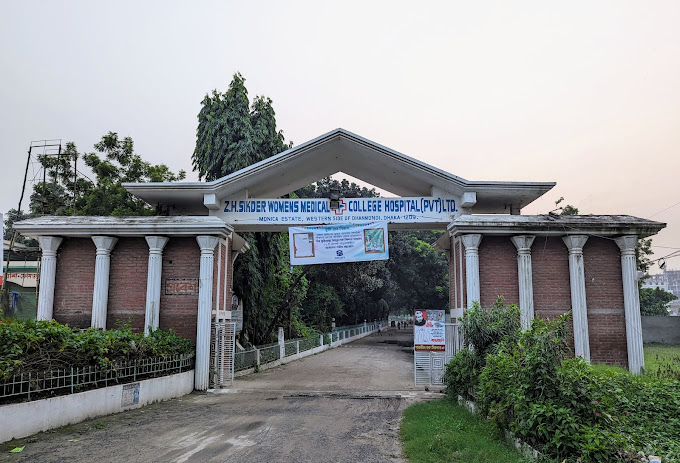
Zainul Haque Sikder Women’s Medical College, located in Dhaka, Bangladesh, stands as a beacon of medical education and healthcare for women in the region. Established with the vision of empowering women in medicine and healthcare, the college holds a significant position in the country's medical landscape.
Zainul Haque Sikder Women’s Medical College was founded in 1992 with the mission to address the gender disparity in the medical field. Bangladesh, like many other countries, faced challenges in providing equal opportunities for women in healthcare. The college was named after Zainul Haque Sikder, a philanthropist known for his contributions to education and healthcare.
The institution's mission revolves around nurturing competent female healthcare professionals who can contribute effectively to the healthcare sector. It aims to promote gender equality in the medical field and address the specific healthcare needs of women and children in Bangladesh. The vision is to produce compassionate and skilled doctors who can serve the community with dedication and integrity.
Zainul Haque Sikder Women’s Medical College offers undergraduate medical education leading to the Bachelor of Medicine, Bachelor of Surgery (MBBS) degree. The curriculum is designed to meet international standards and incorporates both theoretical knowledge and practical training. The college emphasizes a holistic approach to medical education, encompassing medical ethics, communication skills, and community engagement.
The college boasts a dedicated team of faculty and staff who are experts in their respective fields. They are committed to providing quality education and mentorship to the students. The faculty members engage in research and academic activities, contributing to the advancement of medical science and healthcare delivery.
Zainul Haque Sikder Women’s Medical College is equipped with state-of-the-art facilities to support teaching, research, and clinical practice. The campus includes lecture halls, laboratories, libraries, and simulation centres to enhance the learning experience. The college also has affiliations with leading hospitals where students gain practical exposure to patient care under the supervision of experienced physicians.
Clinical training is an integral part of the medical curriculum at Zainul Haque Sikder Women’s Medical College. Students undergo rotations in various departments in its 400-bed hospital where they get hands-on experience in diagnosing and treating patients. The internship period allows students to apply their theoretical knowledge in real-life medical scenarios and develop clinical competence.
The college encourages research and innovation among students and faculty members. Research projects covering a wide range of medical topics are undertaken, with the aim of advancing medical knowledge and improving healthcare practices. Students are encouraged to participate in research activities, thereby fostering a culture of inquiry and critical thinking.
Over the years, Zainul Haque Sikder Women’s Medical College has earned recognition for its academic excellence and contributions to healthcare. Graduates of the college have gone on to pursue successful careers in various specialties, both nationally and internationally. The college continues to uphold its reputation as a center of excellence in women's medical education.
Zainul Haque Sikder Women’s Medical College plays a vital role in shaping the future of healthcare in Bangladesh. Through its commitment to education, research, and community service, the college is empowering women to become leaders in the medical profession. As it continues to evolve and grow, Zainul Haque Sikder Women’s Medical College remains dedicated to its mission of excellence in women's healthcare education and service to humanity.
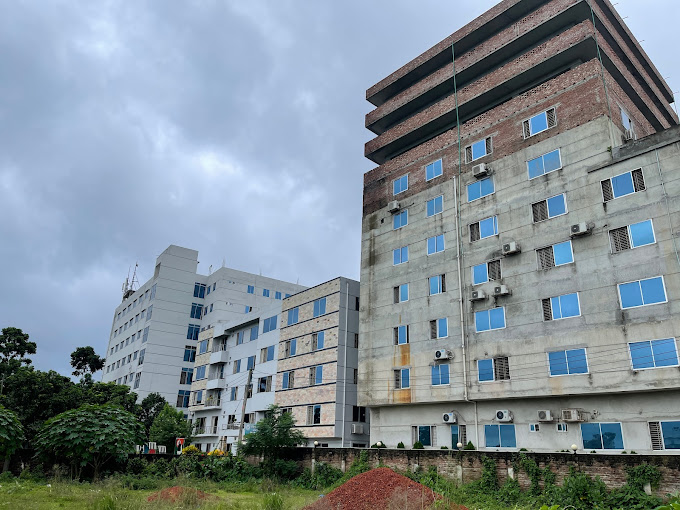
Barind Medical College, situated in Rajshahi, Bangladesh, stands as a prominent institution in the realm of medical education within the country. Founded to address the burgeoning need for healthcare professionals, particularly doctors, in Bangladesh, the college has evolved into a center of excellence in medical training, research, and healthcare delivery.
Established in response to the growing demand for medical education and healthcare services in the northwestern region of Bangladesh, Barind Medical College commenced its journey in the early 21st century. The institution's inception marked a significant milestone in addressing the healthcare disparities prevalent in the region. With the vision of producing competent healthcare professionals and improving healthcare accessibility, Barind Medical College embarked on a mission to nurture talent and foster a culture of academic excellence.
Barind Medical College offers a diverse array of academic programs catering to the multifaceted landscape of medical education. The institution provides undergraduate and postgraduate degrees in various disciplines of medicine and allied health sciences. The undergraduate curriculum encompasses a comprehensive study of basic medical sciences, clinical medicine, and community health, equipping students with the requisite knowledge and skills to become proficient healthcare practitioners.
The college maintains affiliations with esteemed medical universities and regulatory bodies, ensuring adherence to rigorous academic standards and guidelines. Affiliation with renowned hospitals and healthcare institutions facilitates clinical training and practical exposure for students, thereby enriching their learning experience and honing their clinical acumen. The college has 500 bed multi-speciality hospital to cater the students for their clinical experience.
Barind Medical College boasts a distinguished faculty comprising accomplished academicians, clinicians, and researchers who are committed to nurturing the next generation of healthcare professionals. The faculty members, renowned for their expertise and dedication, play a pivotal role in imparting knowledge, fostering critical thinking, and instilling professional ethics among students.
The college's infrastructure reflects a blend of modern amenities and state-of-the-art facilities designed to support the academic, research, and clinical endeavours of its students and faculty. Well-equipped laboratories, libraries stocked with a vast repository of medical literature, and advanced clinical training facilities contribute to a conducive learning environment conducive to academic excellence and professional growth.
Barind Medical College places significant emphasis on fostering a culture of research and innovation aimed at advancing medical knowledge, addressing prevalent health challenges, and improving patient care. The institution encourages faculty and students to engage in scholarly research, clinical trials, and epidemiological studies, thereby contributing to the global body of medical literature and enhancing the quality of healthcare delivery.
Through collaborative partnerships with academic and research institutions, both domestically and internationally, Barind Medical College endeavours to leverage cutting-edge technologies and interdisciplinary approaches to tackle complex health issues, promote disease prevention, and optimize treatment modalities.
Barind Medical College remains steadfast in its commitment to excellence, continuous improvement, and adherence to ethical principles in medical education, research, and clinical practice. The institution's leadership, faculty, and staff collaborate synergistically to uphold the highest standards of professionalism, integrity, and accountability, thereby ensuring the holistic development of students and the delivery of compassionate, evidence-based healthcare services to the community.
Barind Medical College stands as a beacon of excellence in medical education and healthcare delivery, embodying the ideals of academic rigor, clinical competence, and social responsibility. Guided by its mission to nurture compassionate healthcare professionals and advance the frontiers of medical science, the college continues to inspire and empower future generations of clinicians, researchers, and healthcare leaders in Bangladesh and beyond.
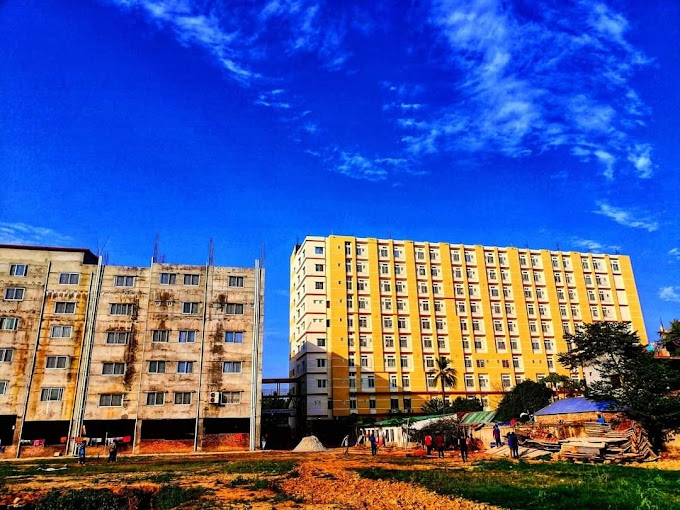
Mainamoti Medical College (MMC) in Bangladesh stands as a prominent institution contributing to the nation's healthcare landscape. Founded on principles of excellence, MMC has been pivotal in shaping medical education and healthcare delivery in Bangladesh. This article explores the institution's history, educational programs, infrastructure, contributions to healthcare, and its role in shaping the future of medical professionals in Bangladesh.
Mainamoti Medical College, situated in Comilla, Bangladesh, was established to address the growing need for competent medical professionals in the country. Founded in [year], the institution was envisioned as a center of excellence in medical education, research, and healthcare services. Its inception marked a significant milestone in Bangladesh's journey towards enhancing healthcare infrastructure and producing skilled medical practitioners.
Mainamoti Medical College offers a comprehensive range of educational programs designed to train medical professionals at various levels. The institution provides undergraduate (MBBS) and postgraduate (MD/MS) programs in various medical disciplines. These programs adhere to international standards and are structured to equip students with the knowledge, skills, and competencies required to excel in the medical field.
The MBBS program at Mainamoti Medical College follows a rigorous curriculum covering fundamental medical sciences, clinical rotations, and hands-on training. The curriculum integrates classroom learning with practical experiences, enabling students to develop a holistic understanding of healthcare practices and patient care.
The postgraduate programs offered by MMC provide advanced training and specialization in diverse medical specialties. Through structured coursework, clinical rotations, research opportunities, and mentorship, postgraduate students receive comprehensive training to become proficient clinicians and researchers in their respective fields.
Mainamoti Medical College boasts state-of-the-art infrastructure and modern facilities to support its educational and healthcare endeavours. The campus is equipped with well-equipped classrooms, laboratories, libraries, and research facilities. The institution prioritizes the use of technology in education and healthcare delivery, with access to advanced medical equipment, simulation labs, and digital learning resources.
The medical college is affiliated with 500 bed multi-speciality day care hospital, providing students with opportunities for clinical exposure and hands-on training in real-world healthcare settings. The hospital offers a wide range of medical services and specialty care units, catering to the healthcare needs of the community while serving as a training ground for medical students and residents.
Mainamoti Medical College is committed to nurturing the next generation of medical professionals who are competent, compassionate, and ethical in their practice. The institution emphasizes holistic development, fostering qualities of leadership, professionalism, and lifelong learning among its students.
Faculty members at MMC are renowned experts and scholars in their respective fields, providing mentorship, guidance, and academic support to students throughout their educational journey. The institution encourages research and innovation, empowering students to explore new frontiers in medical science and contribute to advancements in healthcare.
Mainamoti Medical College also prioritizes continuing medical education and professional development, offering workshops, seminars, and conferences to keep medical professionals abreast of the latest developments in medicine and healthcare delivery.
Mainamoti Medical College stands as a beacon of excellence in medical education, research, and healthcare delivery in Bangladesh. With its commitment to academic rigor, innovation, and service to the community, MMC continues to shape the future of healthcare in Bangladesh and beyond. Through its educational programs, infrastructure, and contributions to healthcare, MMC remains dedicated to producing skilled medical professionals who are poised to make meaningful contributions to the well-being of society.
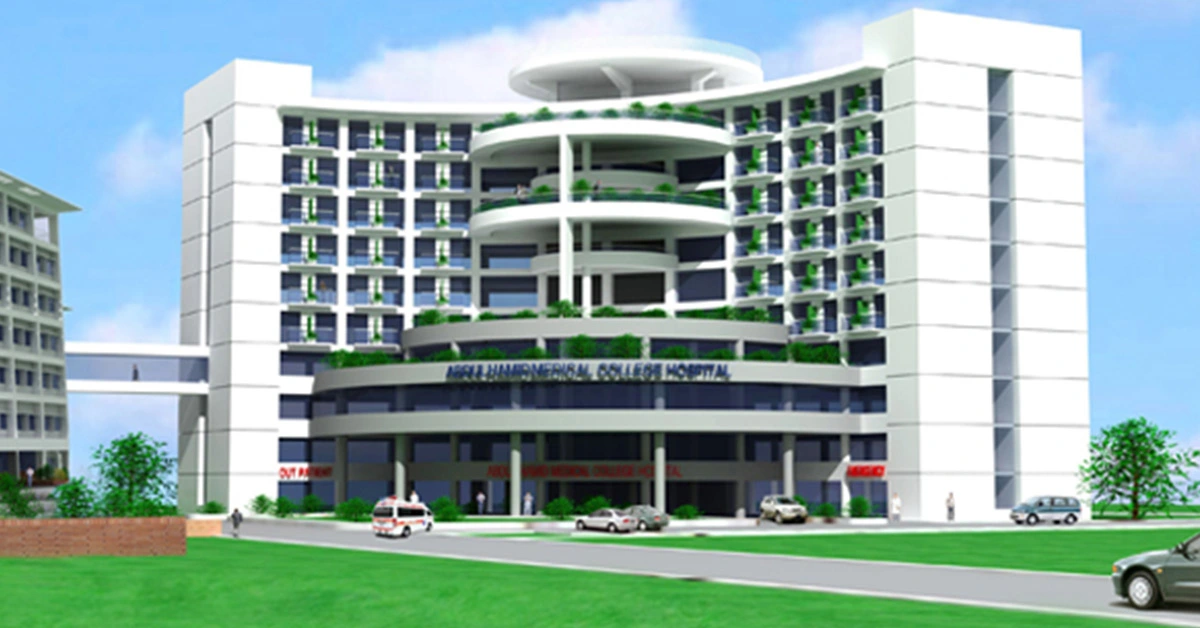
President Abdul Hamid Medical College, located in Kishoreganj, Bangladesh, stands as a beacon of medical education and healthcare service in the region. Founded to address the pressing need for competent healthcare professionals and quality medical services, the college embodies a commitment to excellence, compassion, and innovation in the field of medicine. In the following discussion, we delve into the institution's history, educational programs, infrastructure, contributions to healthcare, and its impact on the community.
President Abdul Hamid Medical College, named after the esteemed President of Bangladesh, was established in response to the growing demand for medical education and healthcare facilities in Bangladesh. The college was founded with the vision of producing highly skilled physicians and healthcare practitioners capable of addressing the diverse healthcare challenges facing the nation and beyond. Its inception represents a significant milestone in the country's pursuit of advancing medical education and healthcare services.
The college's mission revolves around nurturing competent medical professionals who are equipped with the knowledge, skills, and ethical values necessary to deliver comprehensive healthcare services. It aspires to be a center of excellence in medical education, research, and patient care, contributing significantly to the improvement of healthcare standards in Bangladesh and globally.
President Abdul Hamid Medical College offers a comprehensive range of academic programs aimed at preparing students for successful careers in medicine and allied health sciences. The core academic program is the Bachelor of Medicine and Bachelor of Surgery (MBBS) degree, which provides students with a rigorous curriculum covering various medical disciplines, clinical training, and hands-on experience in healthcare settings.
The college also offers postgraduate programs, including residency training in various specialties and subspecialties, allowing physicians to further enhance their skills and expertise in specific areas of medicine. Additionally, the institution provides continuous medical education and professional development opportunities for practicing healthcare professionals, ensuring they remain abreast of the latest advancements in medical science and technology.
President Abdul Hamid Medical College boasts a team of highly qualified and experienced faculty members who are dedicated to delivering quality education, conducting cutting-edge research, and providing compassionate patient care. The faculty comprises renowned physicians, scientists, and healthcare professionals who bring diverse expertise and perspectives to the academic and clinical environments.
Support staff, including administrative personnel, technicians, and healthcare workers, play a crucial role in facilitating the college's operations and ensuring the smooth functioning of its various departments and facilities.
The college is equipped with state-of-the-art infrastructure and facilities designed to support its educational, research, and healthcare missions effectively. The campus features modern classrooms, lecture halls, laboratories, and research centers outfitted with the latest equipment and technology necessary for academic and scientific pursuits.
Clinical training is facilitated through their own 250 bed multi-speciality day care hospital and healthcare institutions, providing students with exposure to a wide range of medical conditions and treatment modalities under the supervision of experienced physicians and healthcare professionals.
President Abdul Hamid Medical College places a strong emphasis on research and innovation as integral components of its academic and healthcare endeavors. Faculty members and students are actively engaged in conducting research across various medical disciplines, contributing to the advancement of medical knowledge, the development of innovative treatments and therapies, and the improvement of healthcare delivery systems.
The college encourages interdisciplinary collaboration and partnerships with other academic institutions, research organizations, and healthcare agencies to foster innovation and address pressing healthcare challenges facing society.
President Abdul Hamid Medical College stands as a testament to Bangladesh's commitment to advancing medical education, research, and healthcare services. With its unwavering dedication to excellence, compassion, and innovation, the college continues to shape the future of healthcare by producing competent healthcare professionals, conducting groundbreaking research, and serving as a beacon of hope and healing for communities in need. As it continues to evolve and expand its reach, President Abdul Hamid Medical College remains steadfast in its mission to make meaningful contributions to the field of medicine and the well-being of society as a whole.
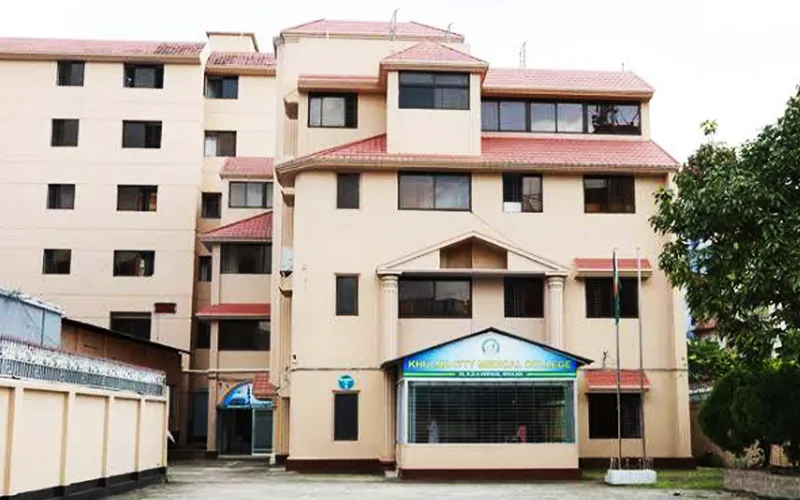
Khulna City Medical College is a prominent medical institution located in Khulna, Bangladesh. Established with the aim of providing high-quality medical education and healthcare services to the people of Khulna and its surrounding regions, Khulna City Medical College has emerged as a leading centre for medical training, research, and patient care in Bangladesh. In this comprehensive overview, we will delve into various aspects of Khulna City Medical College, including its history, infrastructure, academic programs, faculty, facilities, achievements, and contributions to the healthcare sector.
Khulna City Medical College was founded in 2011 to address the growing demand for medical education and healthcare services in the southwestern region of Bangladesh. The college is affiliated with the University of Rajshahi and approved by the Bangladesh Medical and Dental Council (BMDC) and the Ministry of Health and Family Welfare, Government of Bangladesh.
The college campus is equipped with state-of-the-art facilities to facilitate modern medical education and research. It boasts spacious lecture halls, well-equipped laboratories, a comprehensive library, auditoriums, accommodation facilities for students and faculty, and various recreational amenities.
The college also has affiliated teaching hospitals of 500 bed super speciality hospital where students receive practical training under the guidance of experienced medical professionals. These hospitals are equipped with advanced medical equipment, intensive care units, operation theatres, diagnostic facilities, and outpatient departments to cater to the healthcare needs of the community.
Khulna City Medical College offers undergraduate and postgraduate medical programs aimed at producing competent and compassionate healthcare professionals. The undergraduate program leads to the award of the Bachelor of Medicine, Bachelor of Surgery (MBBS) degree upon successful completion of a five-year curriculum, followed by a one-year internship period.
The college also offers postgraduate training in various specialties and subspecialties to enhance the skills and knowledge of medical graduates. These programs include residency training, diploma courses, and fellowship programs in disciplines such as internal medicine, surgery, pediatrics, obstetrics and gynecology, orthopedics, radiology, anesthesia, and more.
Khulna City Medical College boasts a dedicated team of highly qualified and experienced faculty members who are committed to excellence in teaching, research, and clinical practice. The faculty comprises professors, associate professors, assistant professors, and lecturers across various disciplines, ensuring a comprehensive and multidisciplinary approach to medical education and training.
In addition to the academic faculty, the college employs skilled healthcare professionals, including physicians, surgeons, nurses, technicians, and support staff, to deliver quality patient care services and support medical education and research activities.
Khulna City Medical College is actively involved in clinical and research activities aimed at advancing medical knowledge, improving patient care, and addressing healthcare challenges. Faculty members and students engage in research projects, scientific publications, conferences, and seminars to contribute to the global body of medical knowledge and promote evidence-based practice.
The college also collaborates with national and international institutions, research organizations, and healthcare agencies to foster innovation, knowledge exchange, and capacity building in the field of medicine and healthcare.
Over the years, Khulna City Medical College has earned recognition and accolades for its contributions to medical education, research, and healthcare delivery. It has consistently maintained high academic standards and produced competent healthcare professionals who serve with distinction in various capacities across Bangladesh and beyond.
The college has also received accreditation from relevant regulatory bodies and professional organizations, underscoring its commitment to quality education, patient care, and ethical medical practice.
Khulna City Medical College stands as a beacon of excellence in medical education, research, and healthcare delivery in Bangladesh. With its strong academic foundation, dedicated faculty, modern infrastructure, and commitment to serving the community, KCMC continues to play a pivotal role in shaping the future of healthcare and medical practice in the region.
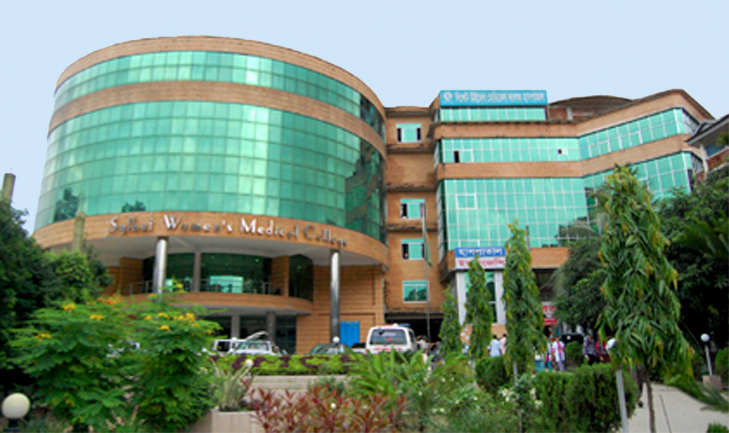
Sylhet Women's Medical College (SWMC) is a renowned medical institution located in Sylhet, Bangladesh. Established to address the growing demand for medical education and healthcare services, SWMC has evolved into a leading centre for medical excellence, particularly focusing on women's health and medical education. In this comprehensive exploration, we delve into the history, mission, academic programs, facilities, and contributions of Sylhet Women's Medical College.
Sylhet Women's Medical College was founded in response to the need for a specialized institution dedicated to the education and empowerment of women in the field of medicine. The college was established in the early 2000s under the aegis of a group of visionary educators and medical professionals who recognized the importance of women's participation in healthcare delivery and medical education.
The mission of Sylhet Women's Medical College revolves around the holistic development of women in the medical profession, aiming to produce competent, compassionate, and culturally sensitive healthcare professionals. The college aspires to contribute significantly to the advancement of medical knowledge, research, and healthcare delivery, particularly in the context of women's health issues.
Sylhet Women's Medical College offers a range of undergraduate and postgraduate medical programs designed to equip students with the knowledge, skills, and ethical values necessary for a successful medical career. The undergraduate program includes a rigorous curriculum covering basic medical sciences, clinical medicine, and community health. Additionally, the college provides postgraduate training in various specialties and subspecialties, allowing medical professionals to pursue advanced studies and specialization in their chosen field.
The faculty and staff of Sylhet Women's Medical College comprise experienced educators, clinicians, and researchers dedicated to excellence in medical education and healthcare. With their diverse expertise and commitment to academic excellence, they play a pivotal role in shaping the intellectual and professional growth of students and fostering a conducive learning environment within the institution.
Sylhet Women's Medical College boasts state-of-the-art facilities and infrastructure essential for quality medical education, research, and patient care. The college is equipped with modern classrooms, lecture halls, laboratories, and simulation centers where students can engage in hands-on learning and practical skill development under the guidance of experienced faculty members. Furthermore, the college houses a well-equipped hospital of 625 bed providing comprehensive clinical rotation to the students.
Research and innovation are integral components of the academic culture at Sylhet Women's Medical College The college encourages faculty members and students to engage in research activities aimed at advancing medical knowledge, addressing healthcare challenges, and improving patient outcomes. Through collaborative research projects, publications, and scientific presentations, SWMC contributes to the global body of medical literature and promotes evidence-based practice in healthcare.
As a pioneering institution dedicated to women's medical education and healthcare, Sylhet Women's Medical College has made significant contributions to advancing women's health and well-being in Bangladesh and beyond. Through its comprehensive medical curriculum, clinical services, and research endeavours, the college addresses a wide range of women's health issues, including maternal health, reproductive health, obstetrics and gynaecology, and gender-based violence.
Sylhet Women's Medical College remains committed to its mission of excellence in medical education, research, and healthcare delivery. The college continues to explore opportunities for collaboration, innovation, and expansion to meet the evolving needs of society and contribute to the advancement of women's health and empowerment globally.
Sylhet Women's Medical College stands as a beacon of excellence in women's medical education and healthcare, embodying a steadfast commitment to academic rigor, compassionate patient care, and societal impact. Through its unwavering dedication to excellence and innovation, SWMC continues to inspire and empower future generations of women healthcare professionals, making a lasting difference in the lives of individuals and communities.
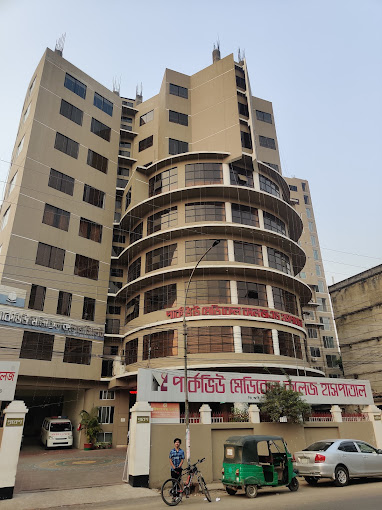
Parkview Medical College is a prominent institution in Bangladesh that stands as a beacon of medical education and healthcare excellence. Established with the mission to produce skilled medical professionals and contribute significantly to the nation's healthcare sector, PMC has emerged as a leading medical college in the country.
Parkview Medical College, located in Sylhet, Bangladesh, was founded with the vision of providing high-quality medical education and fostering medical research and innovation. The institution was established in response to the growing demand for competent healthcare professionals in Bangladesh and the region.
Parkview Medical College boasts state-of-the-art infrastructure and facilities designed to facilitate effective learning and practical training for its students. The college campus features modern classrooms, well-equipped laboratories, libraries stocked with an extensive collection of medical literature, and advanced research facilities. Additionally, PMC provides comfortable accommodation for students and faculty members, ensuring a conducive environment for academic pursuits.
Parkview Medical College offers undergraduate and postgraduate programs in various medical disciplines, including medicine, surgery, paediatrics, gynaecology, orthopaedics, and more. The curriculum is comprehensive and designed to meet international standards, incorporating theoretical knowledge, practical training, and clinical experience.
Parkview Medical College boasts a dedicated team of highly qualified faculty members who are experts in their respective fields. The faculty comprises experienced medical professionals, researchers, and scholars committed to imparting knowledge and nurturing the intellectual growth of students. Additionally, the college employs competent administrative staff who ensure the smooth functioning of academic and extracurricular activities.
One of the distinguishing features of Parkview Medical College is its emphasis on clinical training and hands-on experience. Students undergo rigorous clinical rotations in affiliated multi-speciality hospital of 500 be and in other healthcare institutions, where they gain practical exposure to various medical specialties and interact with patients under the guidance of experienced practitioners. This clinical internship is a vital component of the curriculum and prepares students for real-world challenges in healthcare delivery.
Parkview Medical College encourages research and innovation among its students and faculty members, fostering a culture of inquiry and discovery. The college provides support and resources for research initiatives across different medical disciplines, facilitating collaborative projects and academic partnerships. Through research endeavours, PMC aims to contribute to the advancement of medical science and address pressing healthcare issues facing society.
Parkview Medical College is recognized by the Bangladesh Medical and Dental Council (BMDC) and affiliated with renowned medical universities and institutions. The college adheres to strict quality standards and maintains accreditation from regulatory bodies, ensuring the credibility and legitimacy of its academic programs and degrees.
In an increasingly interconnected world, Parkview Medical College fosters global partnerships and collaborations with leading academic institutions and healthcare organizations worldwide. Through exchange programs, joint research projects, and collaborative initiatives, the college promotes cross-cultural exchange and enriches the learning experience of its students and faculty members.
As Parkview Medical College continues to evolve and expand, it remains committed to its core values of excellence, integrity, and compassion. The college endeavors to stay at the forefront of medical education and research, equipping future healthcare professionals with the knowledge, skills, and values necessary to make a meaningful impact in the field of medicine.
Parkview Medical College stands as a testament to Bangladesh's commitment to advancing medical education and healthcare delivery. With its focus on academic excellence, clinical training, research, and community engagement, PMC plays a pivotal role in shaping the future of healthcare in Bangladesh and beyond.
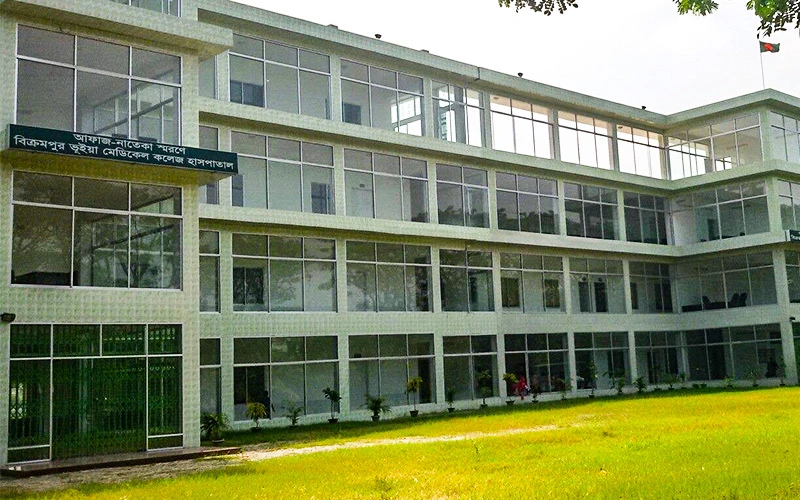
Bikrampur Bhuiyan Medical College stands as a testament to Bangladesh's commitment to providing accessible healthcare and medical education to its citizens, especially in the vast deltaic regions where medical facilities are often scarce. Established with a vision to bridge the healthcare gap, the college has emerged as a beacon of hope, catering to the medical needs of millions and nurturing the next generation of healthcare professionals. In this comprehensive narrative, we delve into the origins, evolution, achievements, challenges, and future prospects of Bikrampur Bhuiyan Medical College.
Bikrampur Bhuiyan Medical College, located in the Munshiganj district of Bangladesh, was founded in 2013 with the aim of addressing the acute shortage of healthcare facilities in the region. Named after its locality, which holds historical significance, the medical college was established through the collaborative efforts of the government, local communities, and healthcare enthusiasts. It began its journey with a modest infrastructure but a grand vision to revolutionize healthcare delivery in the deltaic belt.
At the heart of Bikrampur Bhuiyan Medical College mission is a commitment to providing affordable, high-quality healthcare services to the underserved populations of Bangladesh. The college envisions becoming a centre of excellence in medical education, research, and patient care, thereby contributing significantly to the nation's health sector development. By fostering a culture of compassion, innovation, and professionalism, it aims to produce competent physicians who are not only clinically adept but also socially responsible.
Bikrampur Bhuiyan Medical College offers a comprehensive range of undergraduate and postgraduate medical programs, including MBBS, BDS, and various specialty and sub-specialty courses. The college boasts state-of-the-art facilities, modern laboratories, well-equipped libraries, and experienced faculty members dedicated to nurturing the intellectual and professional growth of students. Through a rigorous curriculum encompassing theoretical knowledge, practical training, and community engagement, BBMC ensures that its graduates emerge as well-rounded medical professionals capable of addressing diverse healthcare challenges.
In addition to its educational endeavours, Bikrampur Bhuiyan Medical College operates a full-fledged 200 bed super speciality hospital that provides a wide array of medical services to patients and clinical rotations to its students for hand on experience in medical studies. Equipped with advanced diagnostic and treatment facilities, the hospital offers specialized care in areas such as internal medicine, surgery, paediatrics, obstetrics and gynaecology, orthopaedics, and more. Moreover, Research and innovation constitute integral pillars of Bikrampur Bhuiyan Medical College academic pursuits. The college encourages faculty members and students to engage in cutting-edge research across various disciplines, addressing prevalent health issues, exploring new treatment modalities, and advancing medical knowledge. Through collaborative partnerships with national and international institutions, BBMC endeavours to contribute meaningfully to scientific literature, healthcare policy formulation, and therapeutic advancements. By fostering a culture of inquiry and discovery, the college seeks to push the boundaries of medical science and enhance healthcare outcomes for all.
Looking ahead, Bikrampur Bhuiyan Medical College is poised to embark on a trajectory of growth, innovation, and excellence. The college aims to enhance its academic programs, infrastructure, and research capabilities to meet the evolving needs of the healthcare sector and society at large. It envisions expanding its clinical services, establishing specialized centres of excellence, and leveraging telemedicine and digital health solutions to improve healthcare access and delivery across remote and marginalized communities. Moreover, BBMC remains committed to fostering a culture of compassion, integrity, and professionalism among its students, faculty, and staff, thereby nurturing a generation of healthcare leaders poised to shape the future of medicine in Bangladesh and beyond.
Bikrampur Bhuiyan Medical College stands as a beacon of hope and healing in the deltaic landscape of Bangladesh, embodying the nation's unwavering commitment to healthcare equity, excellence, and inclusivity. With its holistic approach to medical education, patient care, research, and community engagement, it epitomizes the transformative power of education, compassion, and collaboration in advancing the health and well-being of individuals and communities alike. As it continues to evolve and innovate, it remains steadfast in its mission to serve as a catalyst for positive change and a symbol of hope for generations to come.
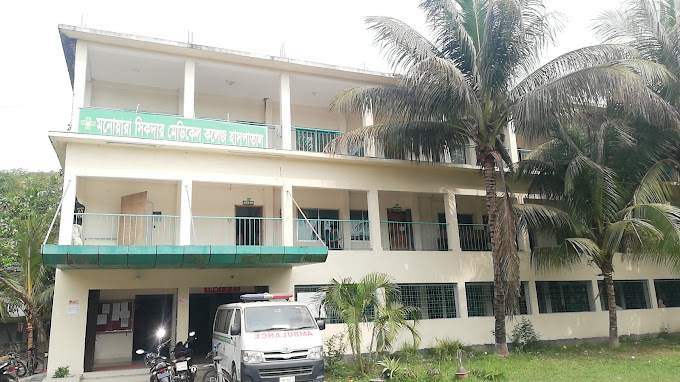
Monowara Sikder Medical College is a prominent medical institution located in Bangladesh, renowned for its dedication to medical education, research, and healthcare services. Established to address the growing demand for healthcare professionals and quality medical education in Bangladesh, Monowara Sikder Medical College has evolved into a respected institution within the country and beyond.
Monowara Sikder Medical College was founded with the vision of providing affordable, high-quality medical education to aspiring students in Bangladesh. The college was established under the aegis of Monowara Sikder Foundation, a philanthropic organization committed to improving healthcare and education sectors in the country.
The mission of Monowara Sikder Medical College is to produce competent healthcare professionals equipped with the knowledge, skills, and values necessary to address the healthcare challenges of the 21st century. The college aspires to excel in medical education, research, and community service, aiming to contribute significantly to the advancement of healthcare in Bangladesh and beyond.
Monowara Sikder Medical College boasts state-of-the-art infrastructure and facilities to facilitate effective learning, research, and patient care. The college campus encompasses modern classrooms, well-equipped laboratories, a comprehensive library, and advanced research facilities. Additionally, the college provides students with access to a teaching in a multi-speciality hospital of 250 bed where they gain practical experience under the supervision of experienced healthcare professionals.
Monowara Sikder Medical College offers undergraduate and postgraduate programs in various medical disciplines. The undergraduate program leads to the award of Bachelor of Medicine, Bachelor of Surgery (MBBS) degree upon successful completion of the curriculum. The college also offers postgraduate programs in specialized fields to further enhance the knowledge and skills of healthcare professionals.
The faculty and staff of Monowara Sikder Medical College comprise highly qualified and experienced professionals dedicated to excellence in medical education and research. The faculty members are renowned experts in their respective fields, committed to nurturing the intellectual and professional growth of students through innovative teaching methods and mentorship.
Research and innovation are integral components of the academic culture at Monowara Sikder Medical College. The college encourages faculty members and students to engage in research activities aimed at addressing pressing healthcare issues, advancing medical knowledge, and improving patient care outcomes. Through research collaborations and partnerships with other institutions, Monowara Sikder Medical College contributes to the global body of medical literature and fosters innovation in healthcare delivery.
Monowara Sikder Medical College is recognized by the Bangladesh Medical and Dental Council (BMDC) and affiliated with leading medical universities in Bangladesh. The college adheres to rigorous quality standards in medical education and training, ensuring that its programs meet the requirements for accreditation and certification.
The alumni of Monowara Sikder Medical College play a vital role in the continued success and development of the institution. Alumni members serve as ambassadors of the college, contributing their expertise and resources to support educational initiatives, mentor current students, and strengthen professional networks within the medical community.
Monowara Sikder Medical College stands as a beacon of excellence in medical education, research, and healthcare services in Bangladesh. With its commitment to academic rigor, innovation, and community engagement, the college continues to make significant contributions to the advancement of healthcare and the training of future generations of healthcare professionals. As it looks towards the future, Monowara Sikder Medical College remains steadfast in its mission to nurture compassionate, competent, and socially responsible healthcare leaders who will make a positive impact on the health and well-being of individuals and communities worldwide.
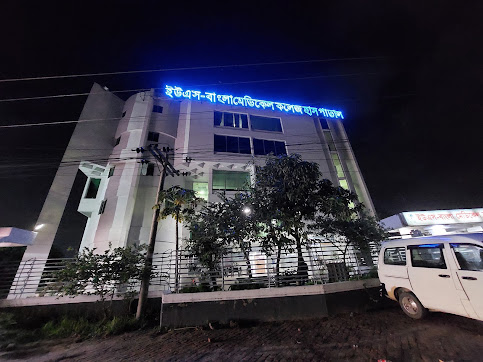
US Bangla Medical College and Hospital stands as a beacon of medical education and healthcare in Bangladesh. Established to meet the growing demand for quality medical services and education in the country, USBMCH has emerged as a prominent institution known for its commitment to excellence in both academia and healthcare delivery.
US Bangla Medical College and Hospital was founded in response to the pressing need for more medical colleges and hospitals in Bangladesh to cater to its burgeoning population and healthcare requirements. The institution was established under the aegis of the US-Bangla Group, a renowned conglomerate with diverse interests ranging from aviation to healthcare.
Located in the serene landscape of Rajshahi, US Bangla Medical College and Hospital commenced its journey with a vision to provide comprehensive medical education and compassionate healthcare services to the people of Bangladesh and beyond. Since its inception, the institution has been steadfast in its mission to produce skilled healthcare professionals and offer state-of-the-art medical facilities to the community.
US Bangla Medical College offers a wide array of academic programs designed to equip students with the knowledge, skills, and values necessary for a successful career in medicine. The institution offers undergraduate and postgraduate programs in various disciplines, including medicine, surgery, dentistry, nursing, and allied health sciences.
The undergraduate medical program, Bachelor of Medicine and Bachelor of Surgery (MBBS), follows a rigorous curriculum that integrates theoretical knowledge with practical clinical experience. Students undergo comprehensive training in basic medical sciences, clinical medicine, surgery, obstetrics and gynecology, pediatrics, and other specialized areas.
US Bangla Medical College and Hospital provides opportunities for postgraduate education and specialization through its residency and fellowship programs. These programs enable medical graduates to pursue advanced training in their chosen fields and become proficient clinicians, researchers, and academicians.
At US Bangla Medical College and Hospital, a team of highly qualified faculty members, comprising renowned physicians, surgeons, and academicians, play a pivotal role in shaping the educational landscape and fostering academic excellence. The faculty members are committed to imparting knowledge, nurturing talent, and mentoring students to become compassionate healthcare professionals dedicated to serving humanity.
In addition to its esteemed faculty, US Bangla Medical College boasts a dedicated team of healthcare professionals and support staff who work tirelessly to ensure the smooth functioning of the institution and the delivery of quality healthcare services to patients.
US Bangla Medical College and Hospital is equipped with modern infrastructure and state-of-the-art facilities to support its academic and healthcare endeavors. The campus features spacious lecture halls, well-equipped laboratories, simulation centers, libraries, and research facilities that facilitate an enriching learning environment for students.
The 350 bed multi-speciality hospital, a cornerstone of US Bangla Medical College and Hospital, is equipped with advanced medical equipment, diagnostic facilities, intensive care units, operation theatres, and specialty clinics to cater to the diverse healthcare needs of patients and for clinical rotations to its in campus medical students. The hospital is staffed with competent healthcare professionals who provide comprehensive medical care across various specialties, including internal medicine, surgery, obstetrics and gynaecology, paediatrics, orthopaedics, cardiology, and neurology, among others.
Research and innovation are integral components of US Bangla Medical College and Hospital academic and healthcare framework. The institution fosters a culture of inquiry, scholarship, and scientific discovery, encouraging faculty members, students, and researchers to engage in cutting-edge research projects, clinical trials, and scientific publications that contribute to the advancement of medical science and patient care.
US Bangla Medical College encourages interdisciplinary collaboration and knowledge exchange among healthcare professionals, researchers, and industry partners to address pressing health issues, develop innovative solutions, and translate research findings into clinical practice for the benefit of patients and society at large.
US Bangla Medical College and Hospital stands as a beacon of excellence in medical education, research, and healthcare delivery in Bangladesh. With its unwavering commitment to academic integrity, clinical excellence, and community engagement, USBMCH continues to uphold its legacy as a premier institution dedicated to nurturing the next generation of healthcare leaders and improving the health and well-being of individuals and communities across the nation.
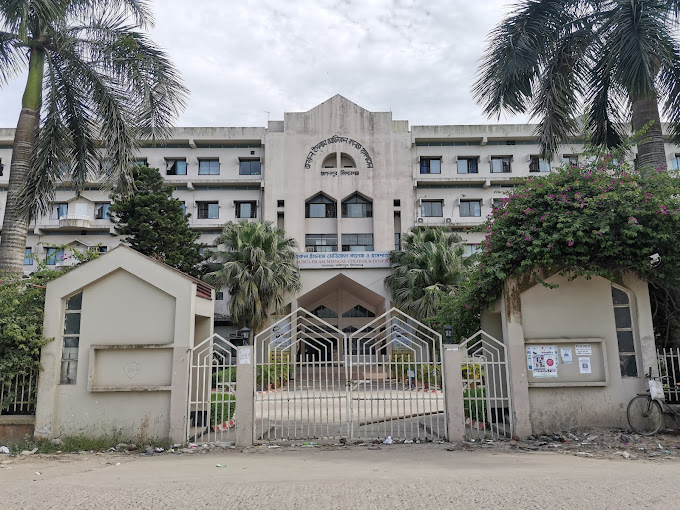
Jahurul Islam Medical College is a prominent institution in Bangladesh dedicated to medical education, research, and healthcare services. Situated in the picturesque location of Bhagalpur, Bajitpur, Kishoreganj, Bangladesh, it stands as a beacon of medical excellence in the country.
Jahurul Islam Medical College was established in 1992 under the Jahurul Islam Medical College Trust as a private medical college. The institution was named after the renowned industrialist and philanthropist of Bangladesh, Jahurul Islam. Since its inception, the college has been committed to producing skilled medical professionals and contributing to the healthcare sector of Bangladesh.
The college campus sprawls over a vast area, providing ample space for academic buildings, hospitals, student accommodations, and recreational facilities. The infrastructure is designed to facilitate modern medical education and research activities. State-of-the-art laboratories, lecture halls equipped with audio-visual aids, and libraries stocked with medical literature contribute to an enriching learning environment.
Jahurul Islam Medical College offers undergraduate and postgraduate programs in various medical disciplines. The undergraduate program leads to the award of the Bachelor of Medicine, Bachelor of Surgery (MBBS) degree upon completion of five years of rigorous study and practical training. The curriculum adheres to international standards and is regularly updated to incorporate advancements in medical science.
The college also provides postgraduate courses and residency programs in specialized fields such as Internal Medicine, Surgery, Paediatrics, Obstetrics and Gynaecology, etc. These programs aim to train medical graduates to become competent specialists in their chosen fields.
The college boasts a highly qualified and experienced faculty comprising professors, associate professors, assistant professors, and lecturers. They engage in research activities, publish scientific papers, and participate in conferences to contribute to the advancement of medical science.
Support staff including administrative personnel, laboratory technicians, and healthcare professionals play a crucial role in the smooth functioning of the institution. Their commitment and dedication ensure that the academic and healthcare services run efficiently.
Jahurul Islam Medical College is affiliated with a 390-bed tertiary care hospital that provides comprehensive healthcare services to the community and clinical rotation to the medical students. The hospital is equipped with modern medical equipment and facilities to diagnose and treat various ailments. It houses departments for General Medicine, Surgery, Paediatrics, Obstetrics and Gynaecology, Orthopaedics, Cardiology, Neurology, and other specialties.
The hospital also serves as a training ground for medical students and interns who gain practical exposure by participating in patient care under the supervision of experienced physicians and surgeons.
Research is an integral part of the academic culture at Jahurul Islam Medical College. Faculty members and students actively engage in research projects aimed at addressing healthcare challenges and advancing medical knowledge. The college encourages interdisciplinary collaboration and provides support for research initiatives through funding and infrastructure.
Many research findings from Jahurul Islam Medical College are published in reputed national and international journals, contributing to the global body of medical literature. The institution also hosts conferences and seminars where researchers present their work and exchange ideas with peers from around the world.
With its commitment to academic integrity, clinical excellence, and social responsibility, Jahurul Islam Medical College continues to nurture the next generation of healthcare professionals and contribute to the advancement of medical science. As Bangladesh progresses towards achieving universal healthcare coverage and improving health outcomes, institutions like Jahurul Islam Medical College play a pivotal role in shaping the future of healthcare in the country.
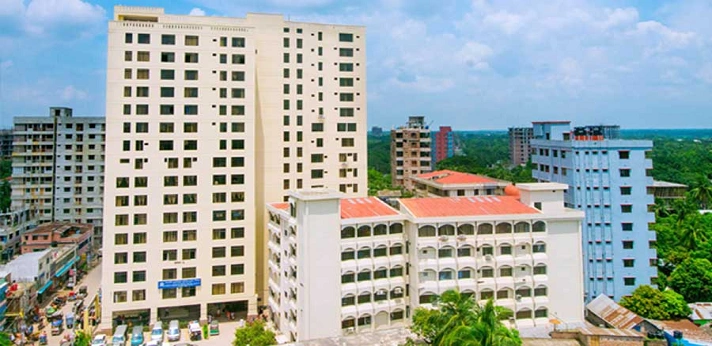
Diabetic Association Medical College, Bangladesh stands as a beacon of medical education and healthcare excellence in the country. Established with a noble vision to combat diabetes and provide quality medical education, Diabetic Association Medical College has emerged as a premier institution in Bangladesh. This comprehensive review delves into the history, educational programs, healthcare services, research endeavours, and societal contributions of DAMC, reflecting its pivotal role in the nation's healthcare landscape.
Diabetic Association Medical College traces its origins to the visionary initiative of the Diabetic Association of Bangladesh (DAB), a non-profit organization dedicated to diabetes care and prevention. Recognizing the escalating burden of diabetes and the need for proficient medical professionals, DAB conceived the idea of establishing a medical college. In 1980, this vision materialized with the inception of DAMC, situated in Faridpur, Bangladesh.
DAMC offers undergraduate and postgraduate medical education programs designed to foster competent physicians equipped to address diverse healthcare challenges. The Bachelor of Medicine and Bachelor of Surgery (MBBS) program is the cornerstone of undergraduate medical education, emphasizing a holistic approach to patient care, clinical skills, and medical research.
The postgraduate training programs encompass various specialties, including Internal Medicine, Surgery, Paediatrics, Obstetrics and Gynaecology, and others. These programs adhere to rigorous standards, blending theoretical knowledge with hands-on clinical experience under the guidance of experienced faculty members.
Diabetic Association Medical College commitment to academic excellence is evident through its state-of-the-art infrastructure, well-equipped laboratories, and simulation facilities that facilitate immersive learning experiences for students.
Diabetic Association Medical College extends its commitment to healthcare beyond the confines of its academic programs. The institution operates a 500 bed multi-disciplinary tertiary care hospital renowned for its specialized services in diabetes management, endocrinology, cardiology, nephrology, and other disciplines. The hospital serves as a lifeline for patients grappling with chronic diseases, offering comprehensive diagnostic, therapeutic, and rehabilitative interventions. Apart from serving the community the hospital also serves as clinical rotation hospital for their medical students.
Multidisciplinary teams comprising physicians, nurses, dietitians, and allied health professionals collaborate to deliver patient-centred care tailored to individual needs. DAMC's hospital not only provides treatment but also emphasizes preventive strategies and patient education to empower individuals in managing their health effectively.
Research constitutes a cornerstone of Diabetic Association Medical College endeavours, driving innovation, and advancing medical knowledge. Faculty members and students actively engage in research activities spanning basic sciences, clinical investigations, and community-based studies. The institution fosters a conducive research environment, facilitating collaborations with national and international partners and securing grants to support impactful research projects.
The research endeavours of Diabetic Association Medical College contribute to the global body of medical literature, addressing pertinent health issues and informing evidence-based practices. Moreover, research findings translate into tangible benefits for patients, enhancing diagnostic accuracy, treatment efficacy, and healthcare outcomes.
The institution collaborates with governmental and non-governmental organizations to implement public health interventions targeting communicable and non-communicable diseases. Community-based research projects focus on epidemiological surveillance, health education, and capacity building, fostering sustainable solutions to pressing health challenges.
Diabetic Association Medical College embraces a global perspective in medical education, research, and healthcare delivery, fostering collaborations with renowned institutions worldwide. These partnerships facilitate knowledge exchange, faculty development programs, and student exchanges, enriching the academic experience and fostering cultural diversity.
International collaborations also extend to clinical research initiatives, joint conferences, and collaborative projects aimed at addressing global health priorities. By leveraging collective expertise and resources, DAMC and its international partners contribute to innovative solutions for complex health issues transcending geographical boundaries.
Diabetic Association Medical College, Bangladesh epitomizes excellence in medical education, healthcare delivery, research, and community engagement. From its humble beginnings, DAMC has evolved into a beacon of hope, transforming lives, advancing medical science, and contributing to the well-being of society. As it continues to uphold its founding principles of compassion, excellence, and innovation, DAMC remains poised to shape the future of healthcare in Bangladesh and beyond.
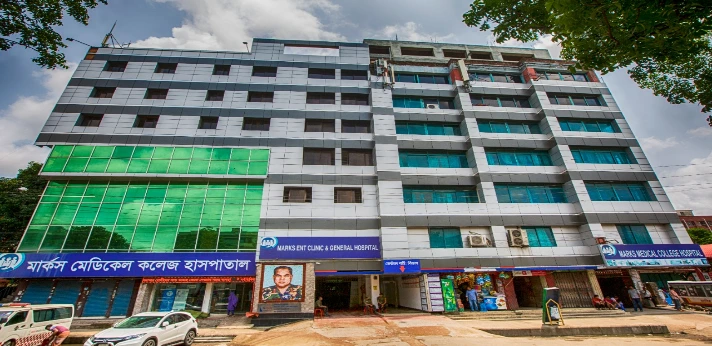
Marks Medical College is a prominent institution in Bangladesh dedicated to providing medical education and healthcare services. Established in 2011, the college has grown to become one of the leading medical institutions in the country, known for its commitment to excellence in medical education, research, and patient care.
Marks Medical College was founded in response to the growing demand for skilled healthcare professionals in Bangladesh, the institution was envisioned as a centre of excellence in medical education and healthcare services. Since its inception, the college has aimed to produce competent doctors who can meet the healthcare needs of the nation.
Located in the bustling city of Dhaka, Bangladesh, the college occupies a spacious and well-equipped campus designed to facilitate the learning and training of medical students. The campus features modern classrooms, well-equipped laboratories, a vast library with an extensive collection of medical literature, and state-of-the-art medical facilities.
Marks Medical College offers undergraduate and postgraduate programs in various medical disciplines. The undergraduate program leads to the degree of Bachelor of Medicine, Bachelor of Surgery (MBBS), which is recognized by the Bangladesh Medical and Dental Council (BMDC) and affiliated with the University of Dhaka.
The college also offers postgraduate programs in different specialties, providing advanced training and specialization for medical graduates. These programs enable doctors to pursue careers in specialized fields such as surgery, internal medicine, paediatrics, obstetrics and gynaecology, and others.
The college boasts a dedicated faculty comprising experienced medical professionals, professors, and researchers who are committed to delivering high-quality education and training to students. The faculty members are experts in their respective fields and play a pivotal role in shaping the academic and professional development of the students.
Marks Medical College encourages research and innovation among its faculty and students to advance medical knowledge and improve healthcare practices. The college supports research initiatives in various medical disciplines and provides resources and infrastructure for conducting research projects.
Through research collaborations with other institutions and organizations, the college contributes to the development of medical science and technology, addressing healthcare challenges and improving patient care outcomes.
One of the key strengths of Marks Medical College is its affiliation of 350 bed super speciality renowned hospital in Bangladesh. The hospital serves as a teaching hospital for the college, providing students with hands-on clinical training under the supervision of experienced physicians and specialists.
The hospital is equipped with modern medical facilities, including outpatient departments, inpatient wards, intensive care units, diagnostic services, and surgical suites. This enables students to gain practical experience in diagnosing and treating a wide range of medical conditions, preparing them for their future careers as medical professionals.
Marks Medical College is recognized by the Bangladesh Medical and Dental Council (BMDC) and affiliated with the University of Dhaka. The college adheres to the standards and guidelines set by these regulatory bodies to ensure the quality of medical education and training provided to students.
The college's MBBS program is accredited by the BMDC, and its graduates are eligible to pursue further education and licensure to practice medicine in Bangladesh and other countries.
Marks Medical College stands as a beacon of excellence in medical education, research, and healthcare services in Bangladesh. With its commitment to academic excellence, innovative research, and community engagement, the college continues to produce competent medical professionals who are dedicated to improving the health and well-being of individuals and communities. As it looks towards the future, Marks Medical College remains steadfast in its mission to uphold the highest standards of medical education and contribute to the advancement of medical science and healthcare in Bangladesh and beyond.

Dr. Sirajul Islam Medical College is a renowned medical institution in Bangladesh, committed to providing high-quality medical education, healthcare services, and research opportunities. Established in 2011, the college has since become a cornerstone of medical education and healthcare delivery in the region. With a vision to produce competent healthcare professionals and contribute to the improvement of public health, DSIMC has earned recognition for its academic excellence, modern facilities, and community engagement.
Dr. Sirajul Islam Medical College was founded in response to the growing demand for medical education and healthcare services in Bangladesh. Named after Dr. Sirajul Islam, a prominent figure in the country's medical community, the college was established with the aim of addressing the shortage of skilled healthcare professionals and improving healthcare accessibility.
Dr. Sirajul Islam Medical College offers undergraduate and postgraduate programs in various disciplines of medicine and allied health sciences. The undergraduate program, Bachelor of Medicine and Bachelor of Surgery (MBBS), is designed to equip students with comprehensive medical knowledge, clinical skills, and ethical values essential for medical practice. The curriculum integrates theoretical learning with practical training in clinical settings to ensure students receive a well-rounded education.
In addition to MBBS, Dr. Sirajul Islam Medical College provides postgraduate training in various specialties and subspecialties, allowing medical graduates to pursue advanced education and specialization in their areas of interest. The postgraduate programs emphasize research, clinical practice, and professional development to prepare students for leadership roles in healthcare.
Dr. Sirajul Islam Medical College boasts a highly qualified and dedicated faculty comprising experienced clinicians, researchers, and educators. The faculty members are committed to fostering an environment of academic excellence, mentorship, and innovation. They actively engage in teaching, research, and clinical practice, providing students with valuable insights and guidance throughout their academic journey.
The college also employs a team of skilled administrative staff who ensure the smooth functioning of academic programs, clinical services, and other institutional activities. Their contributions play a crucial role in maintaining the college's operations and facilitating an optimal learning environment for students.
Dr. Sirajul Islam Medical College is equipped with state-of-the-art facilities and infrastructure 500 bed super speciality hospital to support its academic and clinical activities. The college campus features modern lecture halls, laboratories, libraries, and research facilities where students can access resources and engage in academic pursuits. The institution also maintains partnerships with leading hospitals and healthcare centres, providing students with opportunities for hands-on clinical training and exposure to diverse medical conditions.
The college prioritizes the use of technology in education and healthcare delivery, incorporating digital learning resources, simulation labs, and telemedicine services into its curriculum. These initiatives enhance learning outcomes, promote innovation, and prepare students to adapt to advancements in healthcare technology.
Research plays a pivotal role in advancing medical knowledge, improving patient outcomes, and driving innovation in healthcare. DSIMC encourages faculty and students to participate in research activities and scholarly endeavors aimed at addressing pressing health issues, exploring new treatment modalities, and contributing to scientific literature.
The college provides research infrastructure, funding opportunities, and mentorship to support research initiatives across various disciplines. Through collaborative partnerships with academic institutions, government agencies, and healthcare organizations, DSIMC contributes to interdisciplinary research projects and initiatives aimed at addressing global health challenges.
Dr. Sirajul Islam Medical College stands as a beacon of excellence in medical education, healthcare delivery, and research in Bangladesh. Guided by a commitment to academic integrity, clinical excellence, and social responsibility, DSIMC continues to nurture the next generation of healthcare professionals and make significant contributions to the advancement of medical science and public health. With its unwavering dedication to excellence and innovation, DSIMC remains at the forefront of medical education and healthcare innovation, shaping the future of healthcare in Bangladesh and beyond.
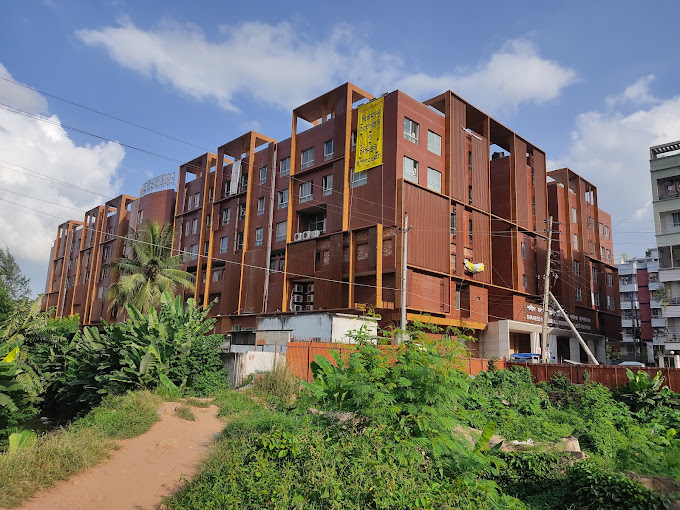
Shaheed Monsur Ali Medical College, located in Bangladesh, stands as a significant institution within the country's medical education landscape. Established to address the growing need for competent healthcare professionals, Shaheed Monsur Ali Medical College has played a pivotal role in shaping the healthcare sector of Bangladesh. In the following narrative, we explore the history, vision, educational programs, facilities, and contributions of SMAMC to the healthcare system of Bangladesh.
Shaheed Monsur Ali Medical College was founded with the aim of providing quality medical education and healthcare services to the people of Bangladesh. The college was established in 1998 in the city of Ultara Model Town, Dhaka, Bangladesh. Its inception was motivated by the vision to produce skilled medical professionals who could contribute to addressing the healthcare challenges prevalent in the country.
The vision of Shaheed Monsur Ali Medical College encompasses the provision of high-quality medical education, research, and healthcare services. It aspires to foster a conducive learning environment that nurtures critical thinking, empathy, and professionalism among its students. The college aims to produce competent healthcare professionals equipped with the knowledge and skills necessary to meet the evolving healthcare needs of Bangladesh.
Shaheed Monsur Ali Medical College offers a range of undergraduate and postgraduate medical programs to aspiring healthcare professionals. The undergraduate program leads to the award of a Bachelor of Medicine and Bachelor of Surgery (MBBS) degree upon successful completion. The curriculum is designed to provide comprehensive theoretical knowledge, practical skills, and clinical exposure essential for medical practice.
In addition to undergraduate programs, college offers postgraduate degrees in various medical specialties and subspecialties. These programs enable medical graduates to pursue advanced training and specialization in their chosen fields, thereby enhancing their proficiency and expertise.
The faculty and staff of Shaheed Monsur Ali Medical College comprise experienced medical professionals, educators, and researchers dedicated to excellence in medical education and healthcare delivery. The faculty members possess diverse clinical and academic backgrounds, contributing their expertise to the holistic development of students. They employ innovative teaching methodologies and engage in research activities aimed at advancing medical knowledge and improving patient care.
Shaheed Monsur Ali Medical College is equipped with state-of-the-art facilities and infrastructure to support its academic and healthcare activities. The college boasts modern lecture halls, well-equipped laboratories, libraries, and research centers conducive to learning and research. The campus also houses teaching hospitals where students gain practical experience under the supervision of experienced clinicians.
The college is committed to providing a safe and supportive environment for its students, faculty, and staff. It adheres to strict safety protocols and maintains high standards of cleanliness and hygiene across its premises.
As part of their training, medical students at Shaheed Monsur Ali Medical College undergo clinical rotations at its 750 bed multi-speciality teaching hospitals. These hospitals serve as training grounds where students apply theoretical knowledge to real-world patient care scenarios. Under the guidance of seasoned healthcare professionals, students develop clinical skills, bedside manner, and ethical values essential for medical practice.
The hospital affiliations also facilitate research collaborations and academic exchanges, enriching the learning experience of students and fostering professional networking opportunities.
Shaheed Monsur Ali Medical College has made significant contributions to the healthcare sector of Bangladesh. It has produced a cadre of skilled healthcare professionals who serve as clinicians, researchers, educators, and policymakers across various healthcare settings. The college's alumni have made notable contributions to medical science, public health, and healthcare delivery, leaving a lasting impact on the health and well-being of the population.
Furthermore, SMAMC actively collaborates with governmental and non-governmental organizations, professional bodies, and international institutions to address healthcare challenges, promote medical research, and enhance healthcare infrastructure.
Shaheed Monsur Ali Medical College stands as a beacon of excellence in medical education, research, and healthcare delivery in Bangladesh. With its unwavering commitment to quality, innovation, and social responsibility, SMAMC continues to nurture the next generation of healthcare leaders and make meaningful contributions to the advancement of healthcare in the country. As Bangladesh strives to address its healthcare needs and achieve universal health coverage, institutions like SMAMC play a pivotal role in shaping the future of healthcare delivery and improving the health outcomes of its people.
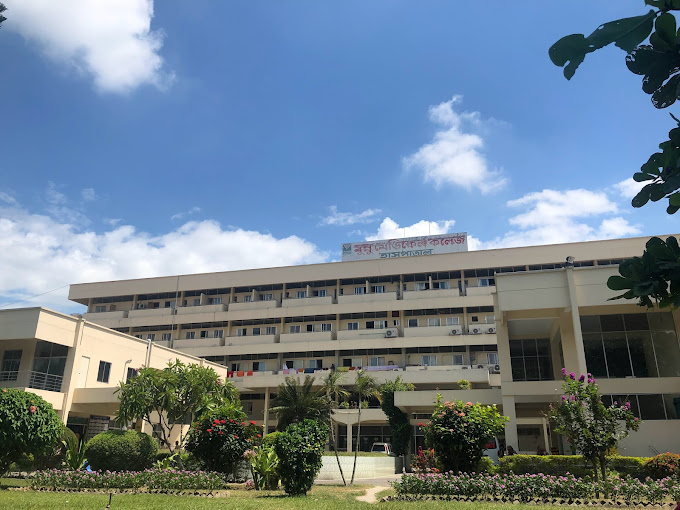
Monno Medical College and Hospital stands as a beacon of healthcare and education in Bangladesh, encapsulating the ethos of excellence, compassion, and innovation. Established to address the burgeoning healthcare needs of the nation, Monno Medical College and Hospital has emerged as a prominent institution renowned for its comprehensive medical education, cutting-edge research, and exemplary patient care.
Located in the heart of Bangladesh, Monno Medical College and Hospital boasts state-of-the-art infrastructure, world-class facilities, and a distinguished faculty dedicated to nurturing the next generation of healthcare professionals. With a holistic approach to medical education, MMCH offers a diverse array of academic programs designed to equip students with the knowledge, skills, and clinical acumen necessary to thrive in today's dynamic healthcare landscape.
At the core of MMCH's mission is its commitment to fostering excellence in medical education. The institution offers undergraduate and postgraduate programs in medicine, nursing, and allied health sciences, providing students with a rigorous academic curriculum complemented by hands-on clinical training. Through a blend of didactic lectures, practical workshops, and clinical rotations, students are exposed to a wide spectrum of medical specialties, enabling them to develop a comprehensive understanding of healthcare delivery.
Central to Monno Medical College and Hospital educational philosophy is the integration of research and innovation into the curriculum. The institution encourages students and faculty members to engage in scholarly inquiry, scientific exploration, and translational research aimed at advancing medical knowledge and improving patient outcomes. From conducting clinical trials to publishing groundbreaking research papers, MMCH fosters a culture of intellectual curiosity and scientific inquiry that fuels innovation and drives progress in healthcare.
Beyond its academic endeavours, Monno Medical College and Hospital is distinguished for its commitment to compassionate patient care and exceptional clinical rotation to its students in 500 bed hospital. The hospital's comprehensive healthcare services encompass a wide range of medical specialties and subspecialties, including cardiology, oncology, neurology, orthopedics, and obstetrics, among others. Equipped with state-of-the-art diagnostic and therapeutic facilities, MMCH delivers personalized, evidence-based care tailored to meet the unique needs of each patient.
In addition to its clinical services, Monno Medical College and Hospital serves as a center of excellence for medical training, continuing education, and professional development. The hospital offers residency programs, fellowships, and continuing medical education courses designed to enhance the skills and knowledge of healthcare professionals across various specialties. Through its commitment to lifelong learning and professional growth, MMCH empowers clinicians to stay abreast of the latest advancements in medical science and practice.
As a testament to its unwavering commitment to excellence, MMCH has garnered recognition and accolades both nationally and internationally. The institution's achievements in medical education, research, and clinical care have earned it a reputation as a centre of excellence and a beacon of hope for patients and healthcare professionals alike.
Monno Medical College and Hospital stands as a shining example of excellence in healthcare and education in Bangladesh. Through its dedication to academic excellence, compassionate patient care, and scientific innovation, MMCH remains at the forefront of medical advancement, poised to shape the future of healthcare in Bangladesh and beyond. With its unwavering commitment to excellence and its steadfast dedication to the highest standards of medical practice, MMCH continues to inspire and uplift the healthcare community, embodying the spirit of healing, compassion, and humanity.
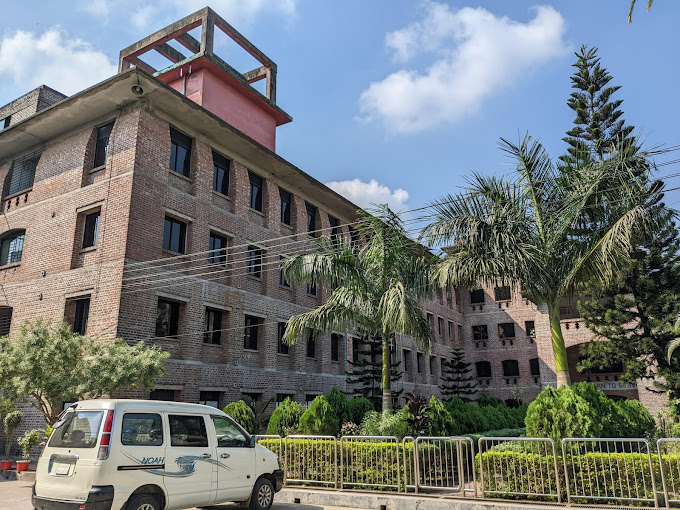
Community-based medical colleges in Dhaka, Bangladesh, stand as beacons of hope, offering not only medical education but also a vision for a healthier, more prosperous future. These institutions are instrumental in addressing the critical shortage of healthcare professionals, especially in rural areas, and are pivotal in shaping the next generation of physicians committed to serving their communities. In this discussion, we explore the significance, structure, challenges, and impact of the Community-Based Medical College (CBMC) in Dhaka.
The Community-Based Medical College in Dhaka holds immense significance in Bangladesh's healthcare landscape. It addresses the pressing need for more doctors, particularly those willing to work in underserved rural areas where healthcare access is limited. By emphasizing community engagement and primary healthcare principles, CBMCs equip medical students with the skills and mindset necessary to address the healthcare challenges faced by the majority of Bangladesh's population.
The structure of the Community-Based Medical College in Dhaka is designed to produce competent and compassionate healthcare professionals. The college has 650 bed hospital designed to meet the clinical requirements for its medical students along with the serving the pateints. This colleges follow a comprehensive curriculum that integrates theoretical knowledge with practical training, including clinical rotations in affiliated hospitals and community health centers. Students are exposed to diverse healthcare settings, allowing them to understand the socio-cultural determinants of health and develop a patient-centered approach to care. Moreover, CBMCs prioritize community-based learning experiences, where students actively participate in health outreach programs, preventive care initiatives, and community health assessments.
To fulfill their potential, Community-Based Medical Colleges in Dhaka must address existing challenges and adapt to evolving healthcare needs. Strengthening faculty recruitment and development, enhancing infrastructure, and expanding clinical training opportunities are essential steps to ensure the quality and relevance of medical education. Furthermore, fostering partnerships with government agencies, non-profit organizations, and international partners can provide additional resources and support to CBMCs. Embracing innovative approaches, such as telemedicine and community health worker programs, can also extend the reach of healthcare services and address disparities in access.
The Community-Based Medical College in Dhaka exemplifies the transformative power of education in healthcare. By training competent, compassionate, and community-oriented healthcare professionals, these institutions play a vital role in addressing healthcare disparities, promoting health equity, and advancing the well-being of Bangladesh's population. Despite facing challenges, CBMCs remain steadfast in their commitment to empowering individuals, strengthening communities, and building a healthier, more prosperous future for all.
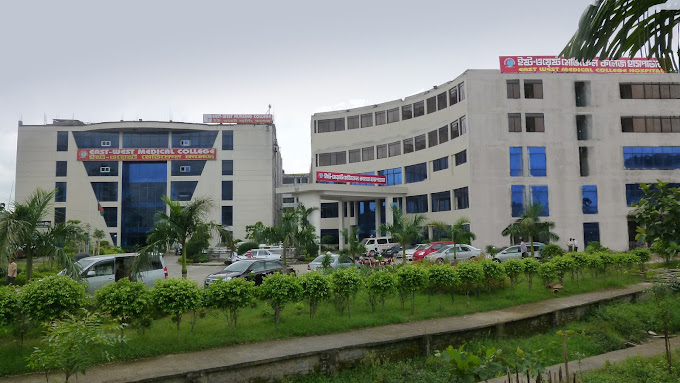
CEast West Medical College and Hospital in Bangladesh stands as a prominent institution in the field of medical education and healthcare. Established with a vision to provide quality medical education and healthcare services, East West Medical College and Hospital has grown to become a significant player in the healthcare sector of Bangladesh. In this comprehensive overview, we delve into the history, infrastructure, academic programs, healthcare services, and contributions of East West Medical College and Hospital.
East West Medical College and Hospital was established in 2000 in Dhaka, Bangladesh. The institution was founded by Dr. M. A. Jalil, a renowned physician and philanthropist with a vision to create a center of excellence in medical education and healthcare delivery.
East West Medical College and Hospital boasts modern infrastructure and state-of-the-art facilities to support its academic and healthcare endeavours. The college campus encompasses spacious classrooms, well-equipped laboratories, libraries stocked with extensive medical literature, and dedicated research facilities. The hospital is equipped with advanced medical equipment, operation theatres, intensive care units, and diagnostic services to cater to the healthcare needs of patients.
East West Medical College offers undergraduate and postgraduate medical education programs to aspiring healthcare professionals. The institution provides a comprehensive curriculum that integrates theoretical knowledge with practical clinical exposure to prepare students for the challenges of the medical profession. The undergraduate program leads to the degree of Bachelor of Medicine, Bachelor of Surgery (MBBS), while postgraduate programs include various specialties and subspecialties.
East West Medical College and Hospital prides itself on its team of experienced faculty members comprising distinguished medical professionals, educators, and researchers. The faculty members are dedicated to imparting quality education, mentoring students, and conducting research to advance medical science and healthcare practices. The institution also employs skilled healthcare professionals and support staff who contribute to the efficient functioning of the hospital and college.
East West Medical College and Hospital provides a wide range of healthcare services to patients across different specialties and disciplines. The hospital offers outpatient consultations, inpatient care, emergency services, surgical procedures, diagnostic imaging, laboratory tests, and rehabilitation services. With a commitment to patient-centred care and clinical excellence, EWMCH strives to address the best clinical experience need to its medical students through 750 bed super speciality hospital equipped with ultra-modern lab and equipment’s.
East West Medical College and Hospital fosters a culture of research and innovation aimed at advancing medical knowledge, improving healthcare practices, and addressing prevalent health challenges. Faculty members and students engage in research activities, clinical trials, and scholarly endeavours to contribute to the global body of medical literature and enhance patient care outcomes. The institution promotes interdisciplinary collaboration and partnerships with national and international organizations to facilitate research initiatives and knowledge exchange.
East West Medical College and Hospital is recognized by the Bangladesh Medical and Dental Council (BMDC) and affiliated with the University of Dhaka, ensuring that its academic programs meet the highest standards of quality and accreditation. The institution maintains affiliations with renowned medical institutions, professional organizations, and healthcare networks nationally and internationally, facilitating collaborations and opportunities for academic exchange and collaboration.
East West Medical College and Hospital stands as a beacon of excellence in medical education, healthcare delivery, and research in Bangladesh. With its commitment to academic integrity, clinical excellence, and social responsibility, EWMCH continues to make significant contributions to the healthcare sector and the well-being of the community. As it moves forward, East West Medical College and Hospital remains dedicated to its mission of producing competent healthcare professionals and providing compassionate medical care to all segments of society.